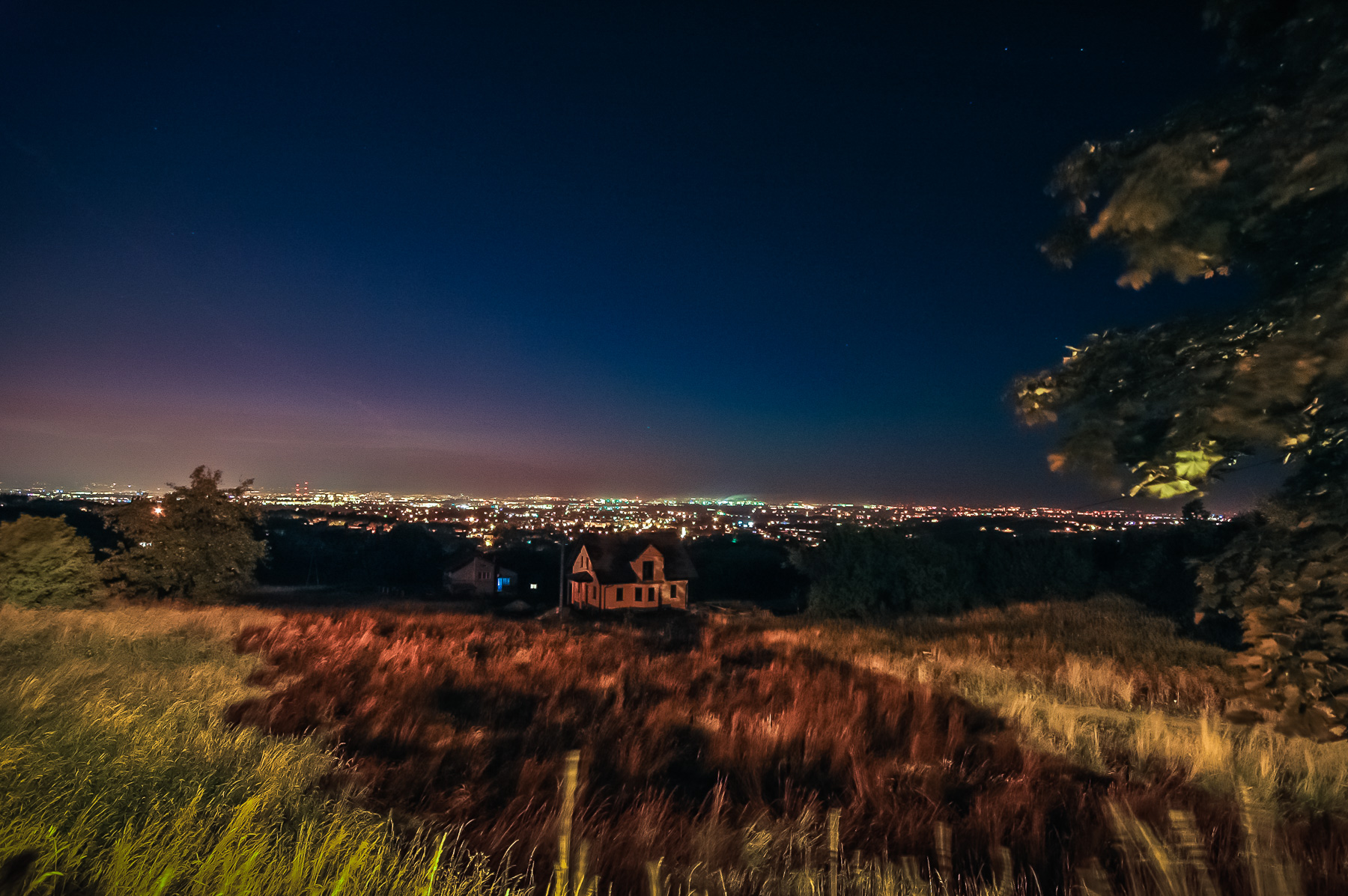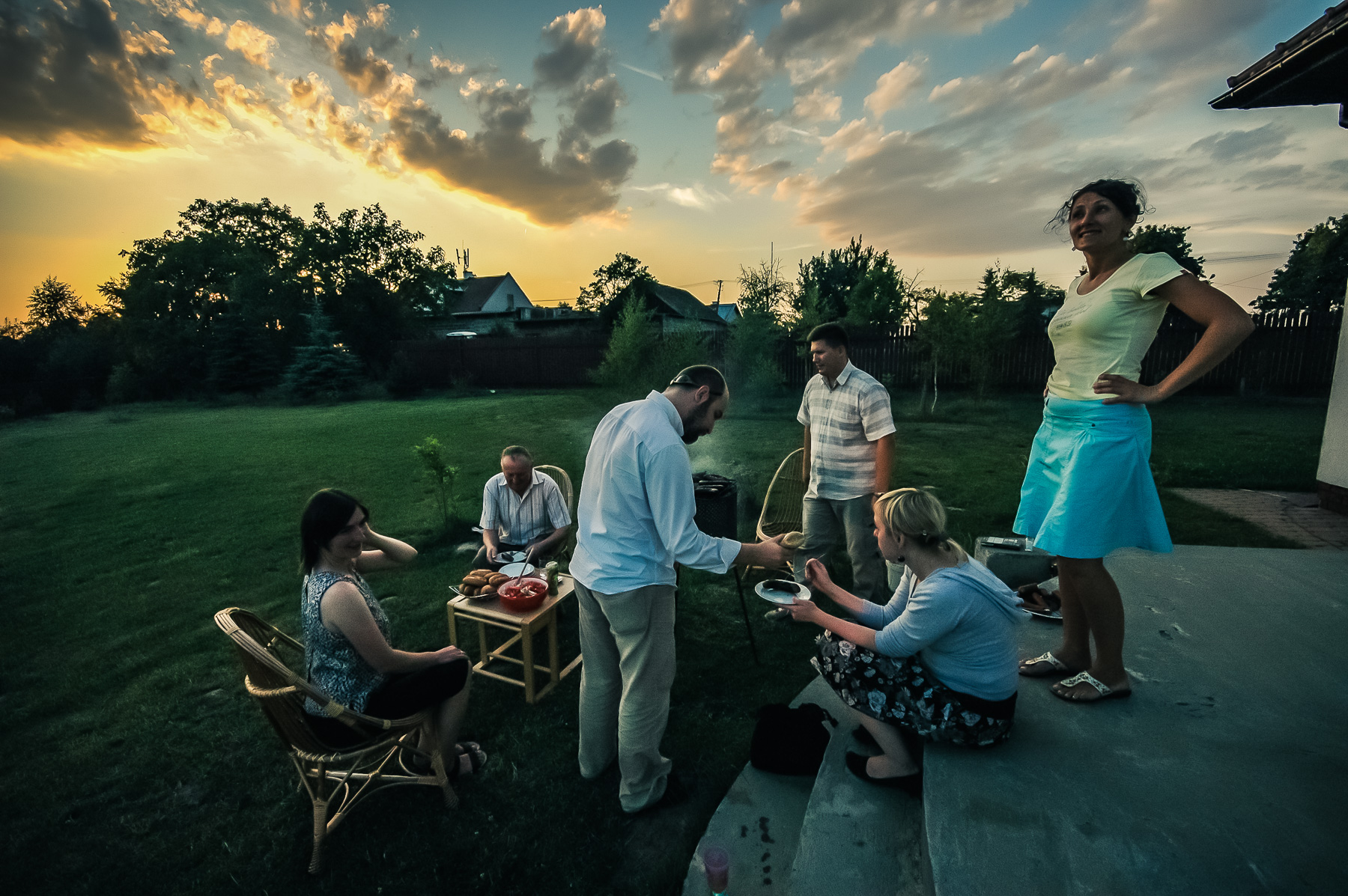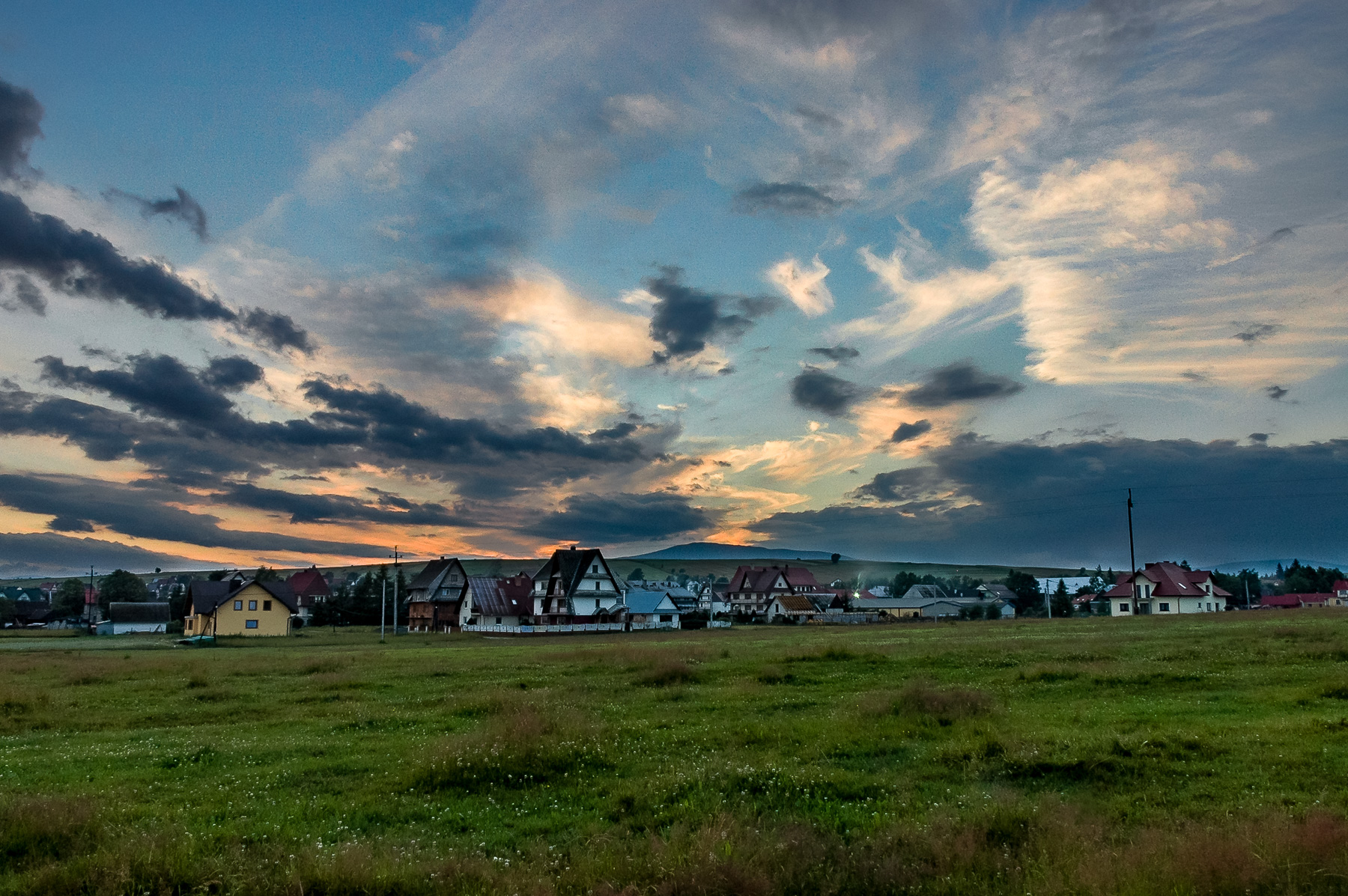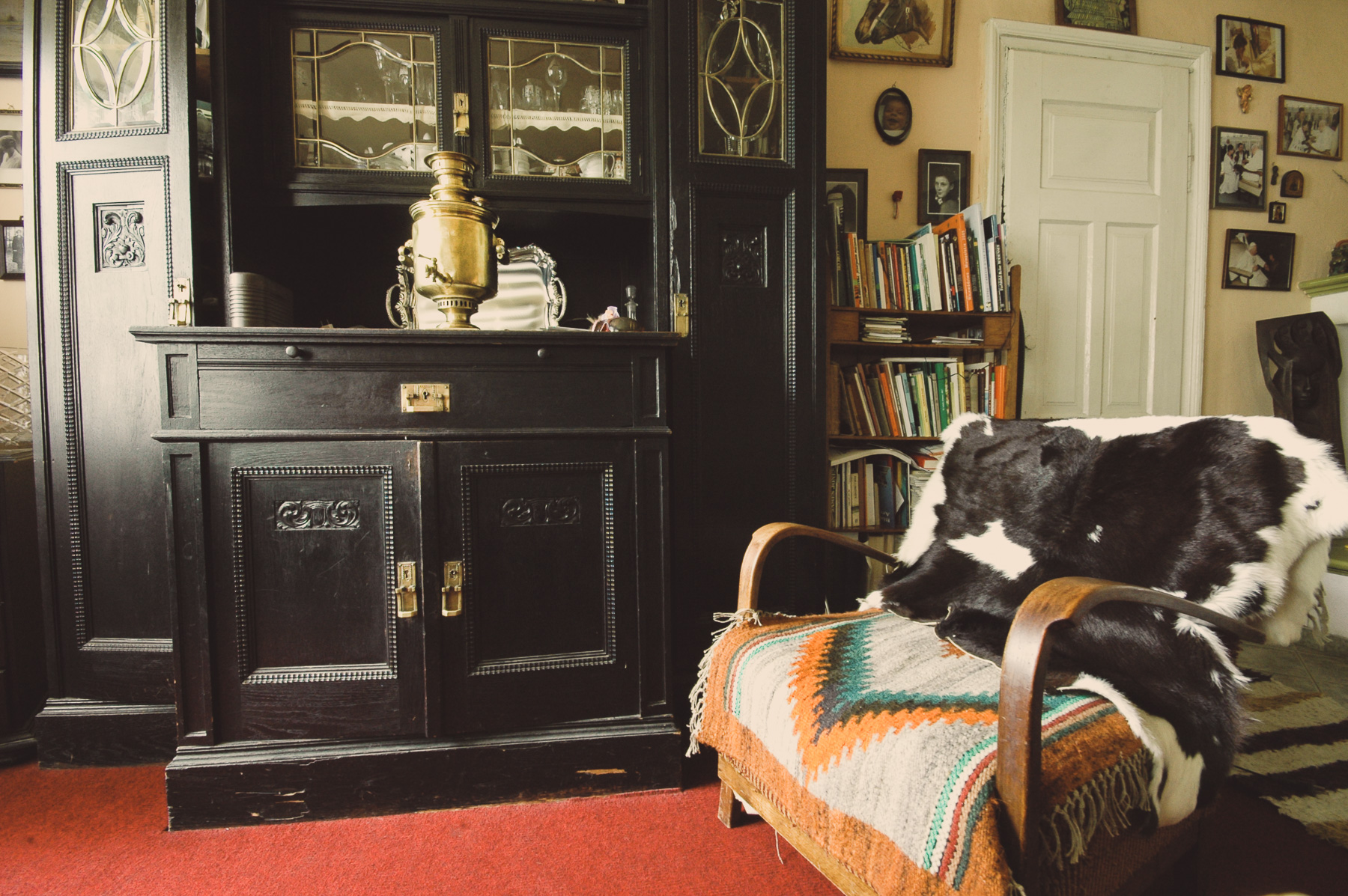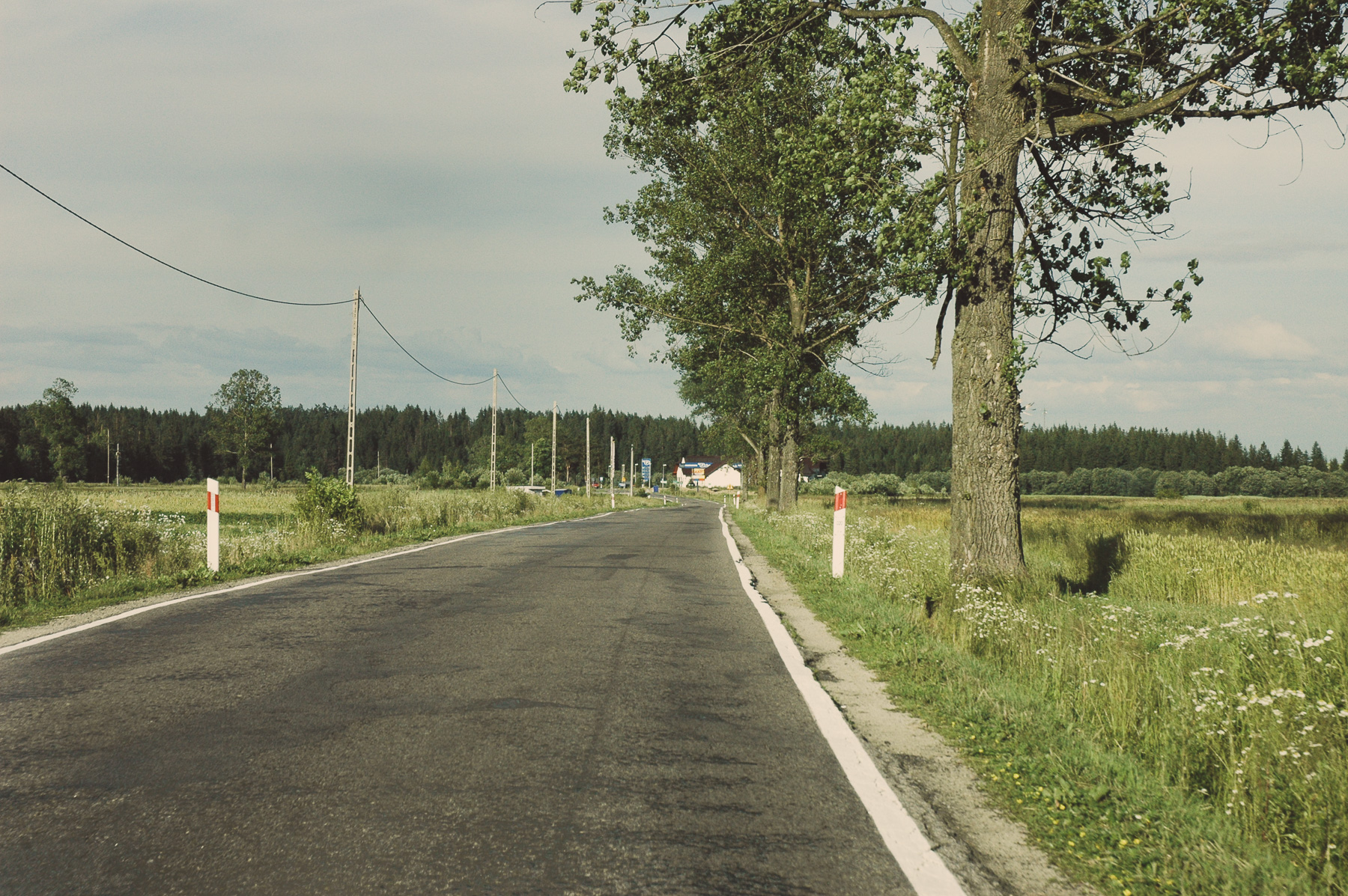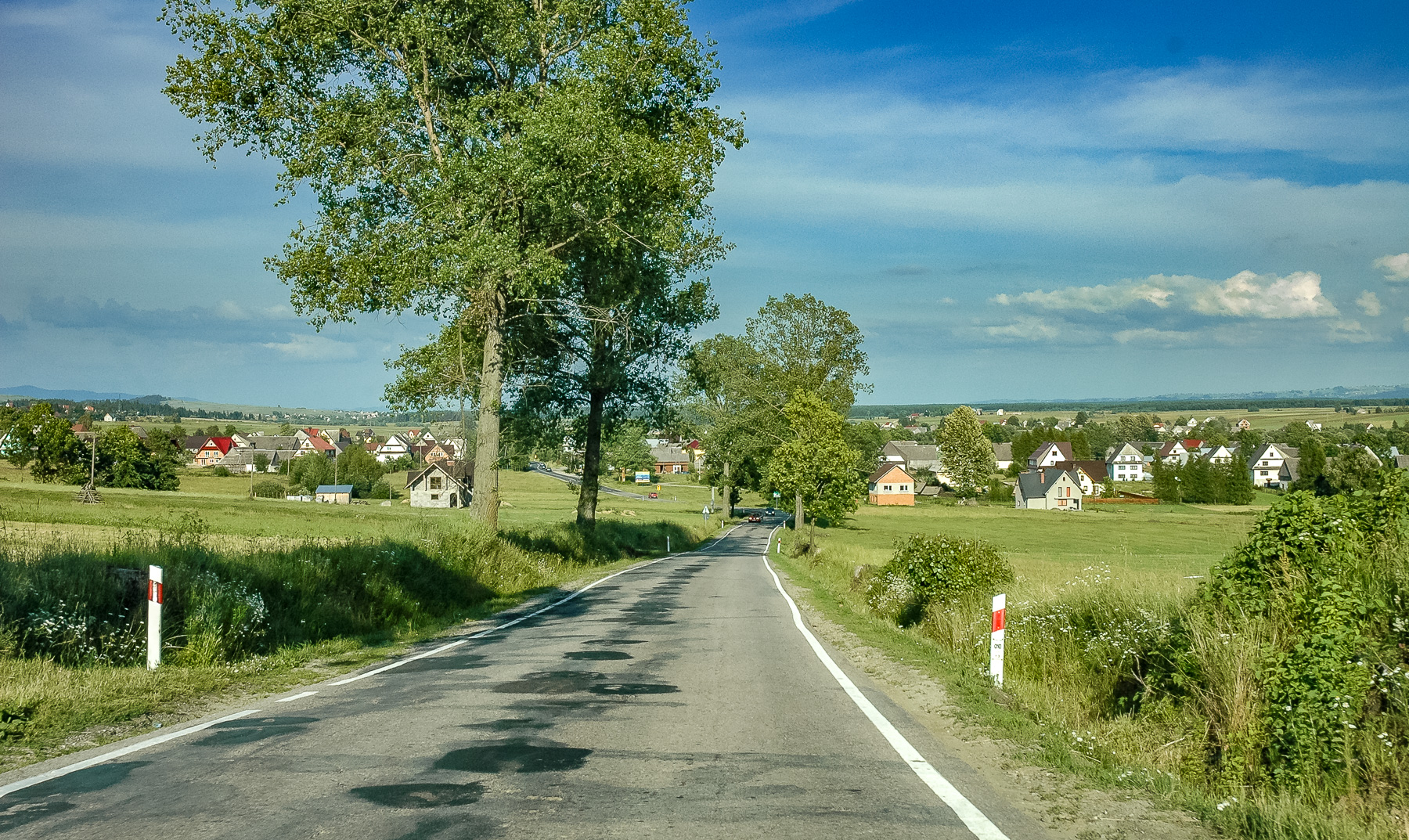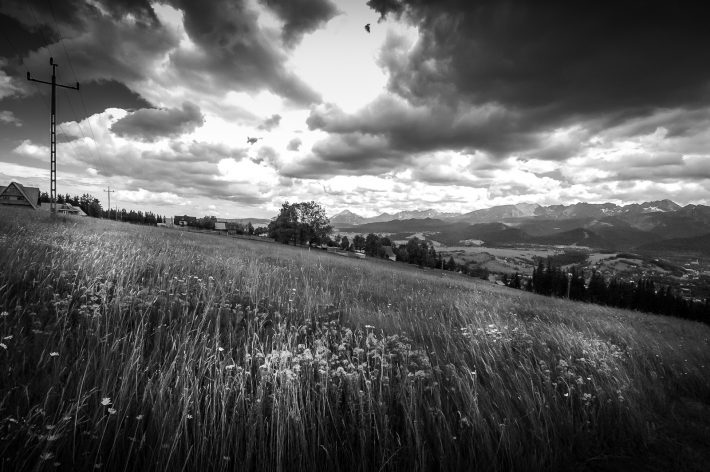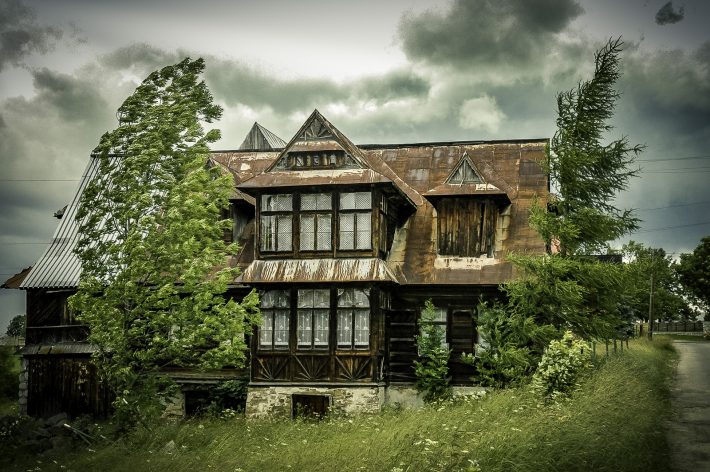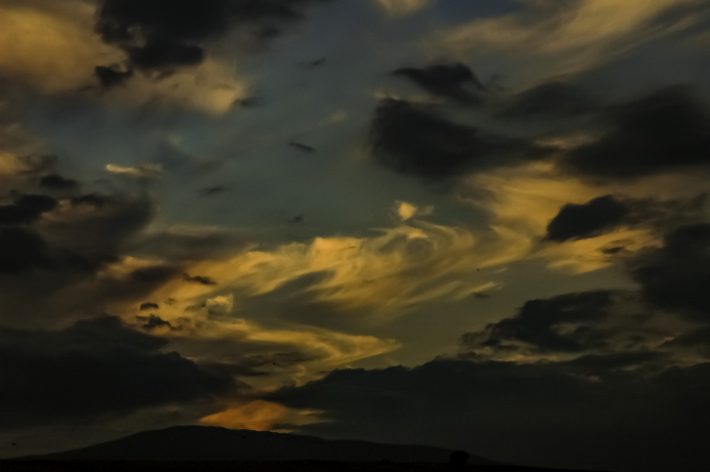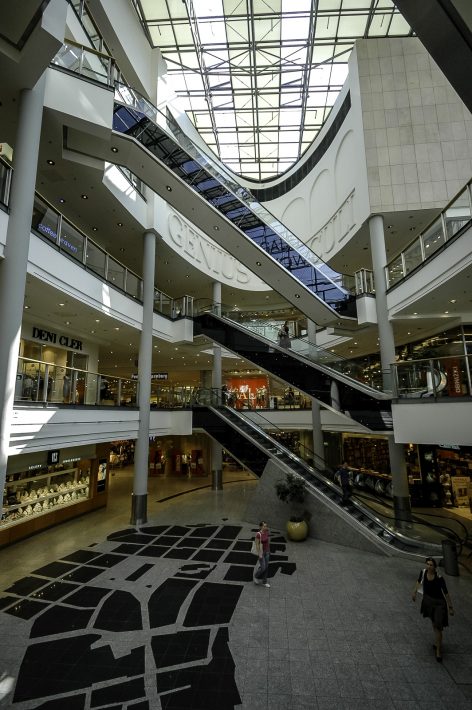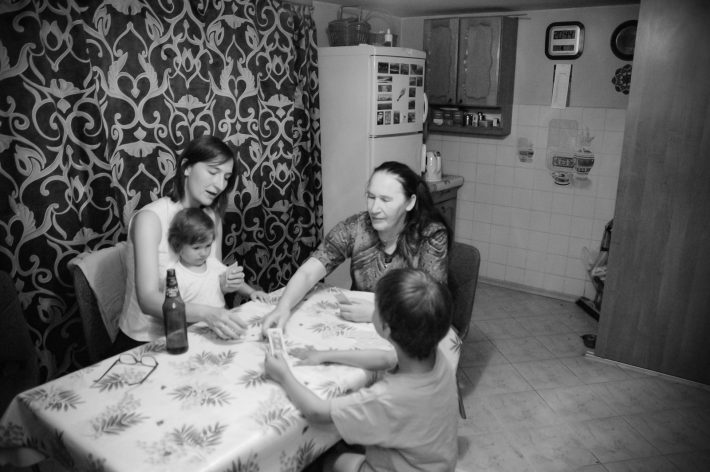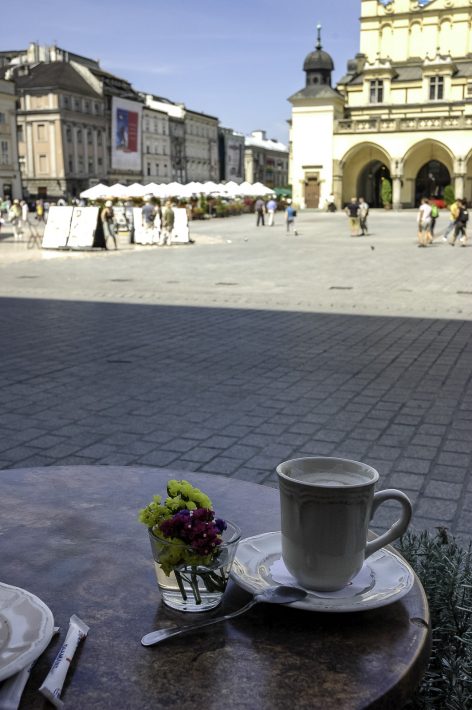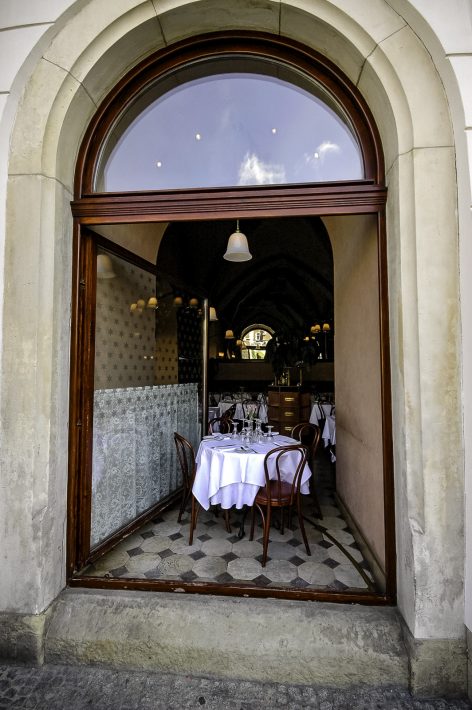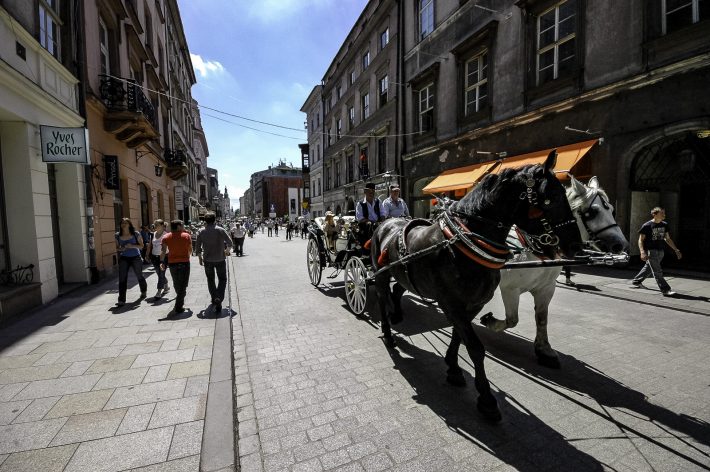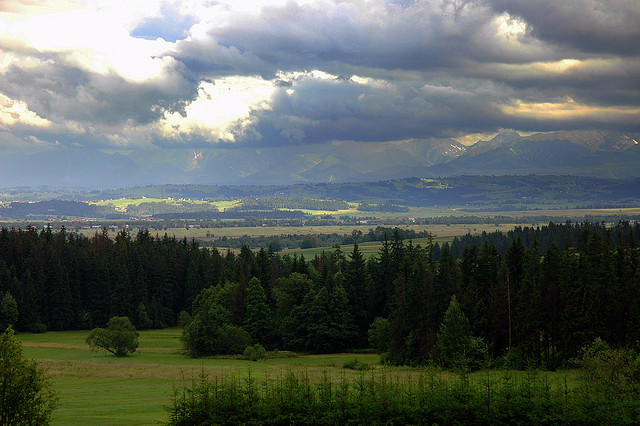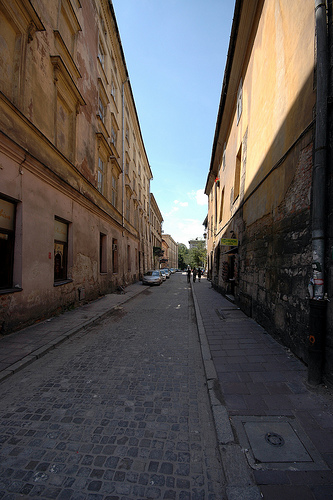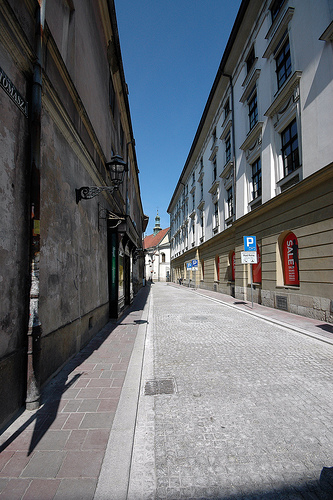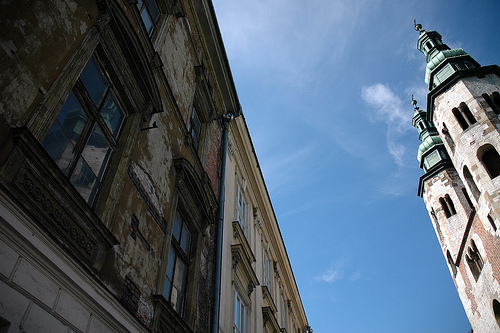Photo from the Past
House in Zab
Sunset over Babia
Krakow Mall
Cousins with Babcia 2008
Coffee on the Rynek
Krakow Restaurant
Horse-Drawn
Baptism
Lipnica Wielka
The village where I spent seven years of my life.
K held the camera as we drove to visit friends. Silly, but I’m sentimental, so it’s excusable. (It’s double-time so it doesn’t take so long, but of course it makes us all sound like chipmunks in the background. It also makes it jerky. Oh well…)
A Day at Gubalowka
We finally began putting together some of the video shot in Polska. First up: our day at Gubalowka, a ridge line above Zakopane that is basically one big playground. We took K’s five-and-a-half-year-old nephew, W, with us.
Storm
A Wista
We got a bit of new music during our trip and I’ll be sharing a little here and there during the coming weeks. Sadly, much of it probably won’t be available in the States.
Once upon a time, there was a Polish folk band called “A Wista.” Comprised of highland students who’d landed in Krakow for studies, the band played a mix Slovakian, Moravian, Balkan, and Hungarian songs, along with traditional Polish songs from the southern, mountainous region of the country.
Their studies long completed, they’ve since gone their separate ways, though K and I have a connection to three of the band members.
- One is the husband of K’s good, better, bestest friend.
- Another, with a newly formed band, played at our wedding.
- A third, with K’s friend’s husband and two others, played at L’s baptism.
It’s a shame they’re no longer together, for their music is truly beautiful: virtuoso playing (violin, viola, and double bass) combined with strong singing.
Here is my favorite from their CD Festiwal Karpat: a haunting Slovakian number:
Anyone interested can buy individual MP3s of the album here.
For fun, here’s the Google translation of the page. The genre in the original Polish is listed as “Ludowa” (“folk”), but Google chose the equally valid translation of “China”.
Narrow Streets
Looking Back at Krakow
We made it home yesterday after an exhausting journey. L fell into fits of hysterical screaming on the flight from Munich to Charlotte, and there was mumbling about the plane regarding it — as well as a few comments swirling around our heads while we stood in the passport control line. The temptation to say something was great, but I decided to keep it a win-lose situation (i.e., we win, acting like adults; they lose, acting like children) instead of descending into a useless argument, for there was no win-win situation in sight as tired as we all were.
The trip was exhausting, but we had wonderful memories to keep up our spirits, including two days in the most magnificant (and second most expensive) city in Polska, Krakow.
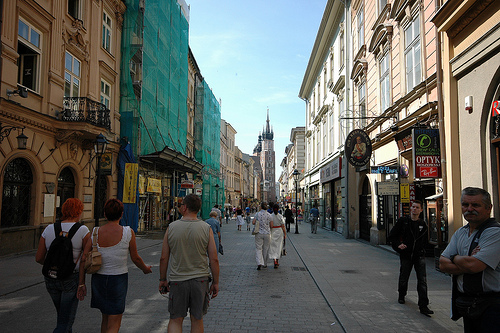
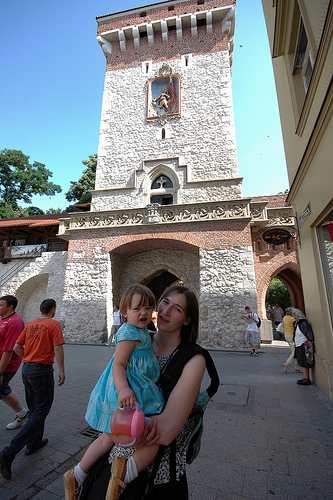
The first thing we noticed, coming by bus, was the new shopping center cum bus stop. When we left in 2005, it looked like this:
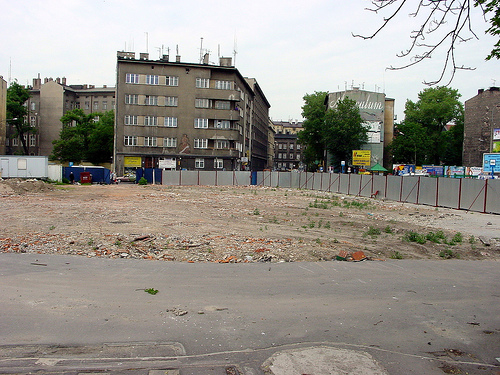
Three years — and a surprising amount of initiative — later:
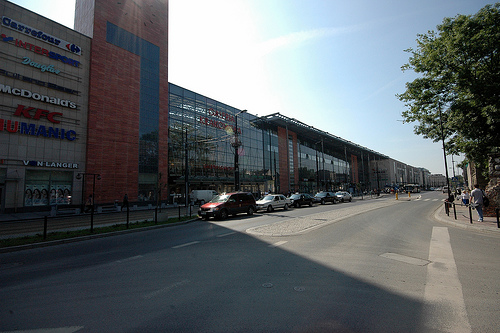
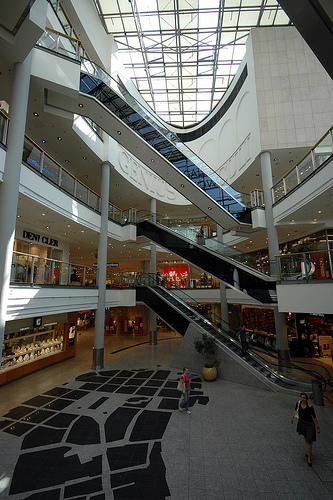
The old bus station was a testament to the hideous nature of Communist architecture, and it was torn down before I even knew it had been slated for demolition. “Oh, what I wouldn’t give for a couple of hours in that old place now,” I told K.
Also victim of the renovation was the “Dragon Bar” (“Bar Smok”), a milk bar across the street from the old bus station. Filthy does not begin to describe it, and once again, I find myself wishing for a 4gb memory card and a day to photograph it.
As we made our way to the rynek, we noted that some things had mercifully not changed. The opera house still greets visitors after they emerge from the passage under Westerplatte Street.
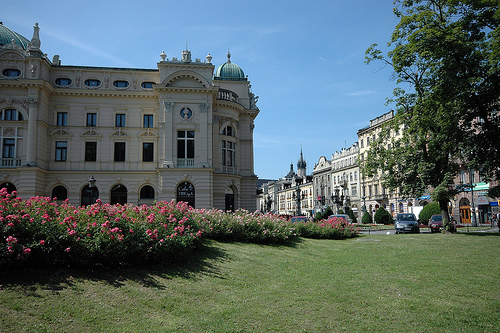
And the corner of Pijarska and Planty streets still looks the same:
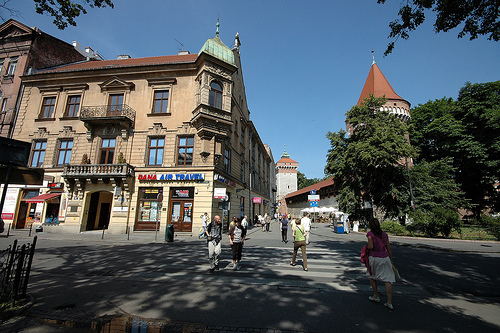
We finally made it to the rynek, where L seemed just as amazed as everyone else is they first time they emerge from Florianska Street onto Krakow’s enormous square:
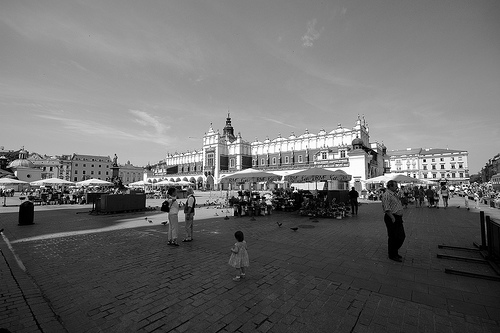
We fed the pigeons,
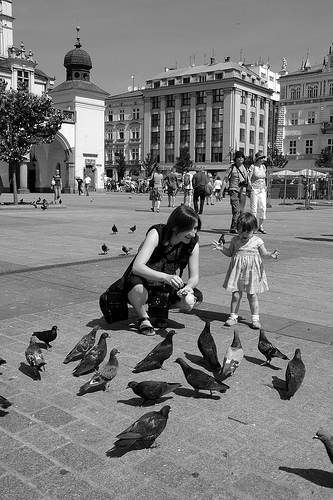
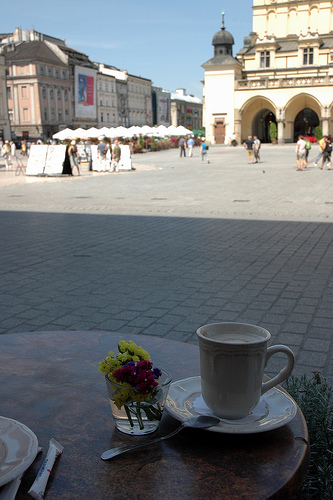
and watched the people around us. Some were trying to get the best shots with classic Russian equipment:
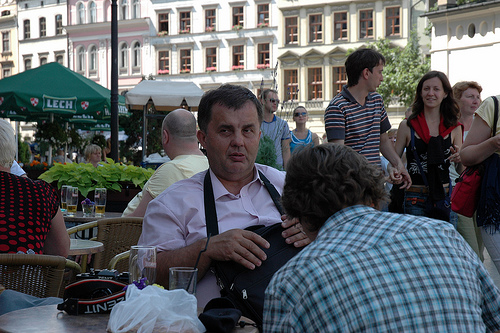
Some were simply passing through:
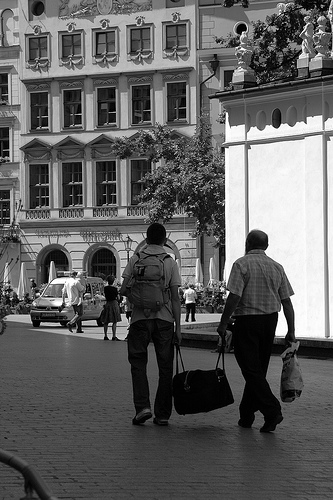
After a short break, we headed inside the Basilica of St. Mary — what I’d bought the 10-20mm for:
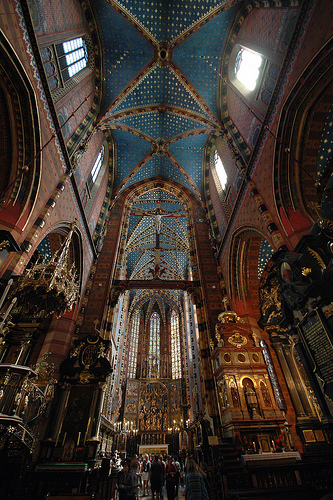
I’d brought a tripod in order to try to get some shots to combine into HDR, but I was kindly informed during my final shot of my first series that tripods were not allowed.
I’m always amazed with the beauty of such places.
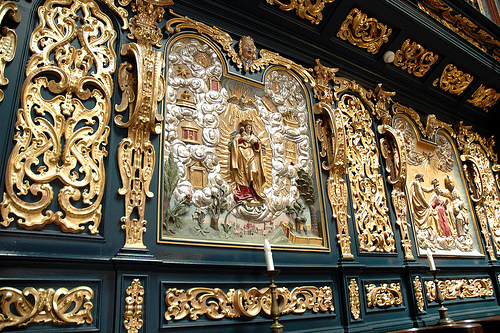
And I’m glad the Church so wisely followed Jesus’ command to feed the starving, clothe the poor, and build ridiculously big churches.
We headed down Grodzka Street toward Wawel castle
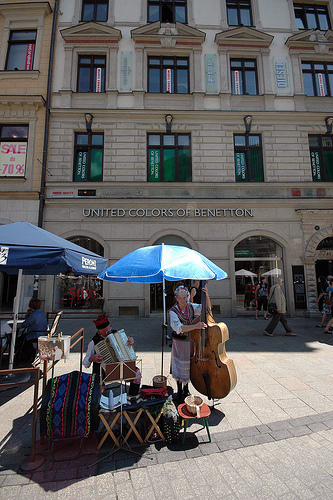
Finally, exhausted, we fell into a cafe for some rest, respite from the sun (L was fussy and sweaty), and, most importantly, a chance to meet up with some of our dearest friends, Kuba and Maja:
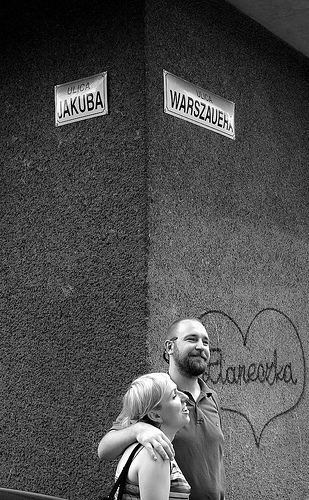
We spent our last New Year’s Eve in Polska with K & M in Hel, a little port town at the tip of a long finger of land into the Baltic Sea.
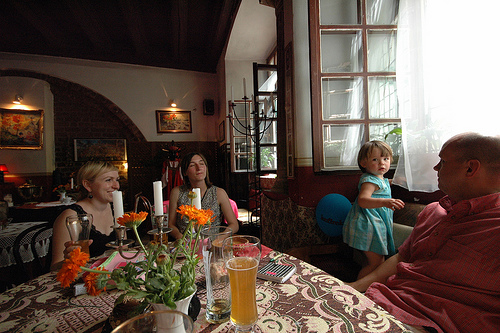
Maja — the “maja” of comments here — has been eager to meet the girl for some time, and they hit it off immediately:
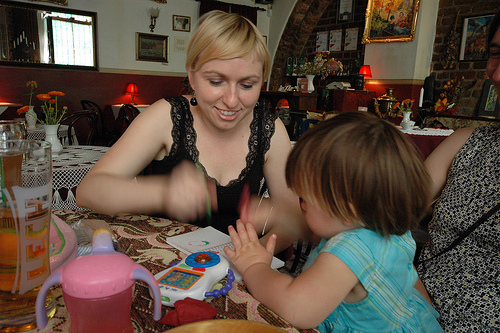
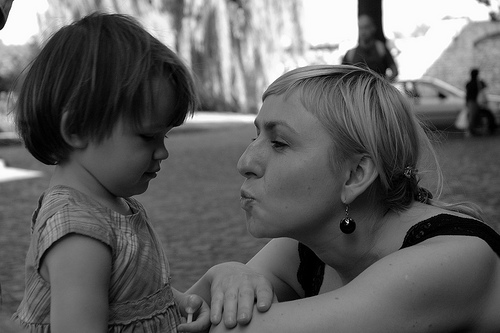
The initial excitement of our reunion finally calmed (M was bouncing off the walls with joy!), we all continued down Grodzka Street
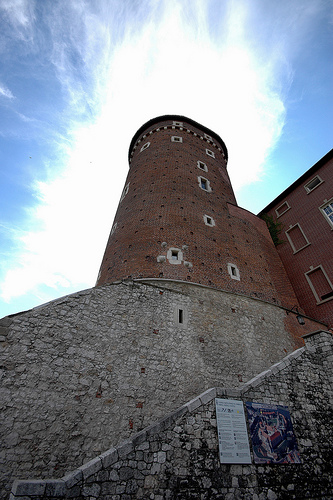
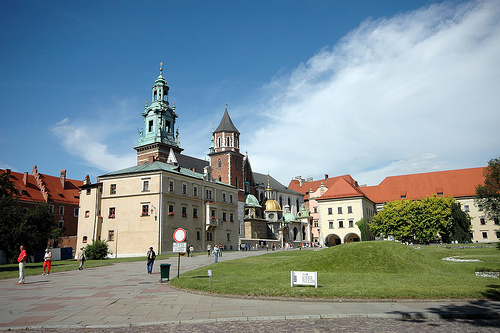
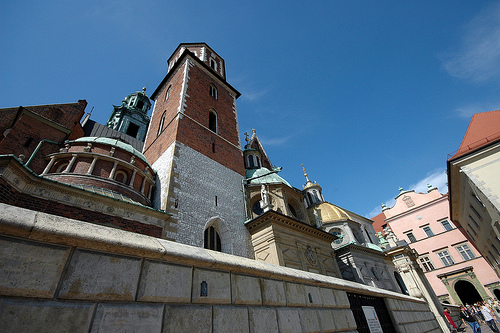
Finally, the Girl had had enough, and so we headed out of Krakow
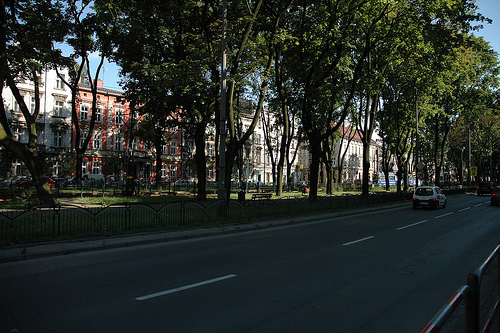
to a little town on the city’s outskirts, where K’s brother, D, lives.
We had grilled sausage to accompany a wonderful evening of reminiscing and talking about the “realities” of life in America.
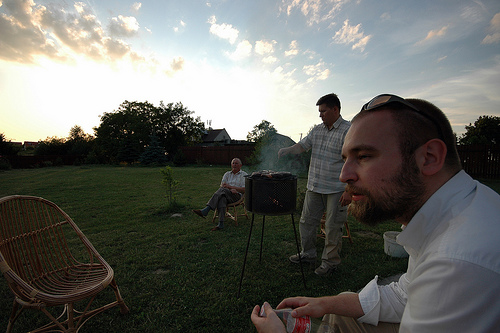
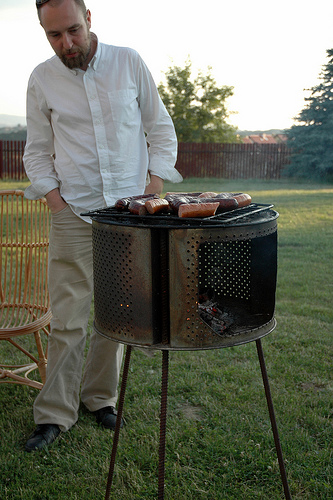
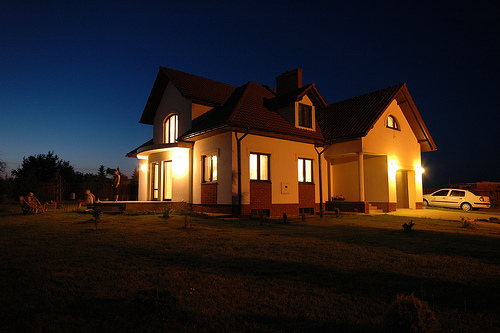
When D saw the wonders of a SLR camera’s bulb setting, he took me to a place to get some night shots of Krakow.
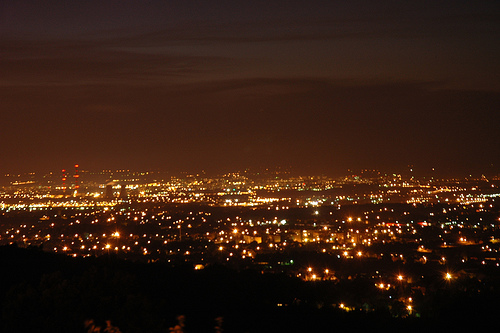
Sadly, there was too much light from the street lights to get good shots, but that fact did lead to this:
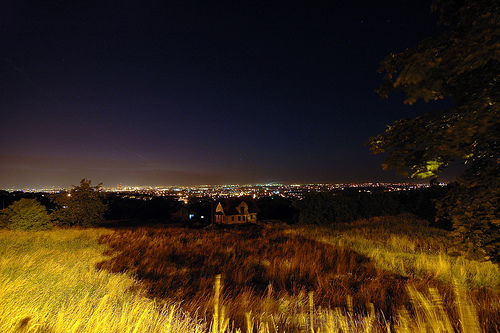
Thus ended our first day in Krakow.
Our second day was much slower and shorter. It included a walk in the park surrounding the old town,
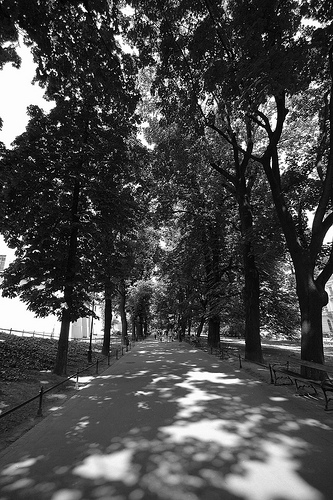
and K taking a few more shots.
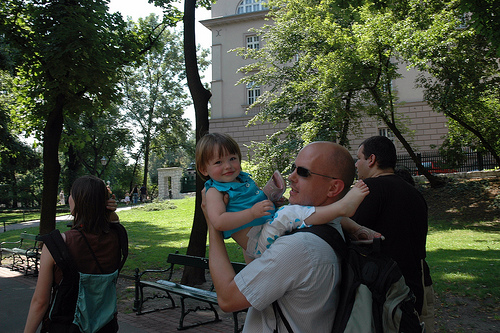
It ended in the old Jewish section of town, at an outside cafe, where still more friends came to meet us.
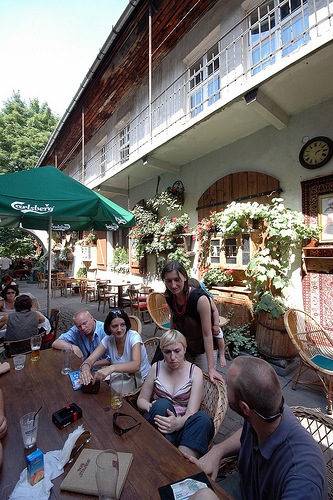
And thus our not-quite-two weeks in Polska came to an end.
More reflections — not to mention pictures — later.
Gubałówka
Last day in Orawa/Podhale. Tired Girl; semi-eager Cousin W. Only one thing to do — go to Gubałówka.
Up the inclined railway
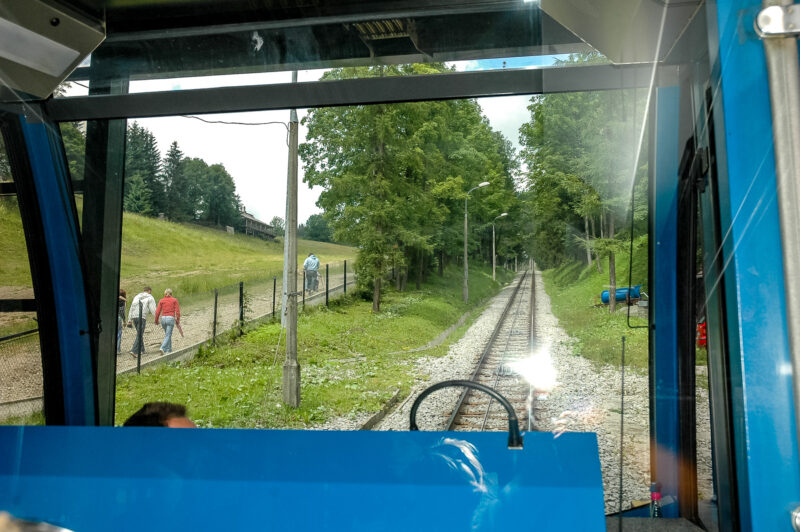
Down the metal bobsled-ish ride with Aunt K:
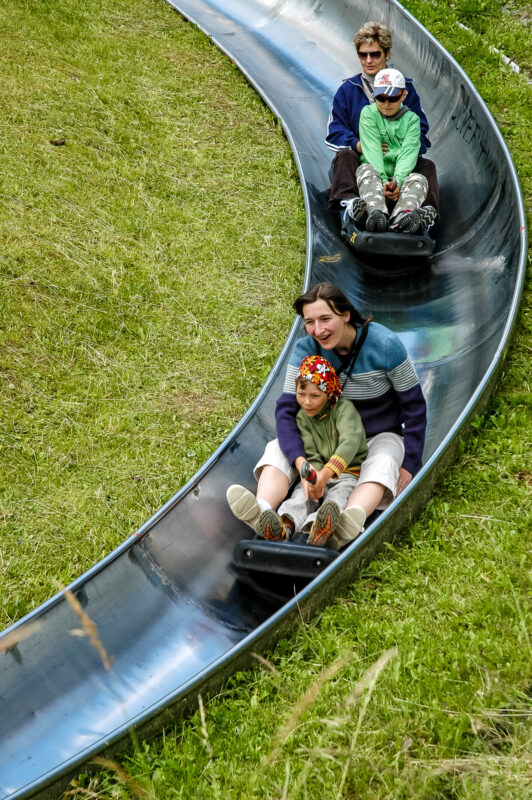
And then a bite to eat.
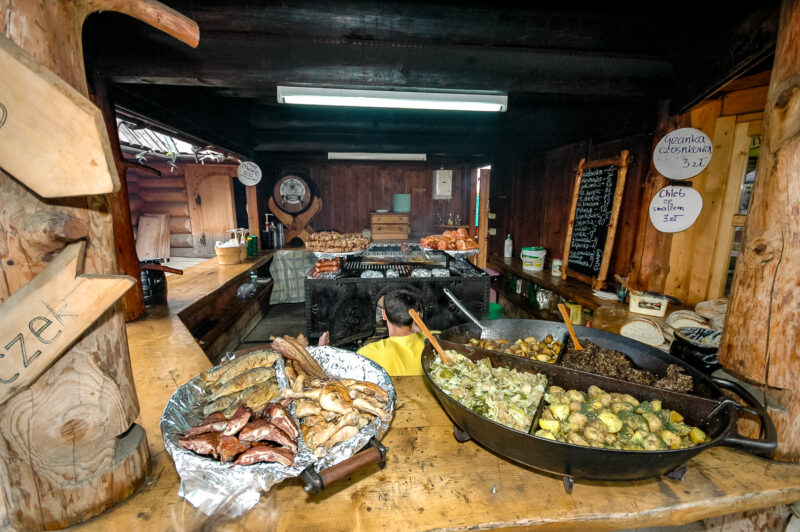
Cousin W had a crepe:
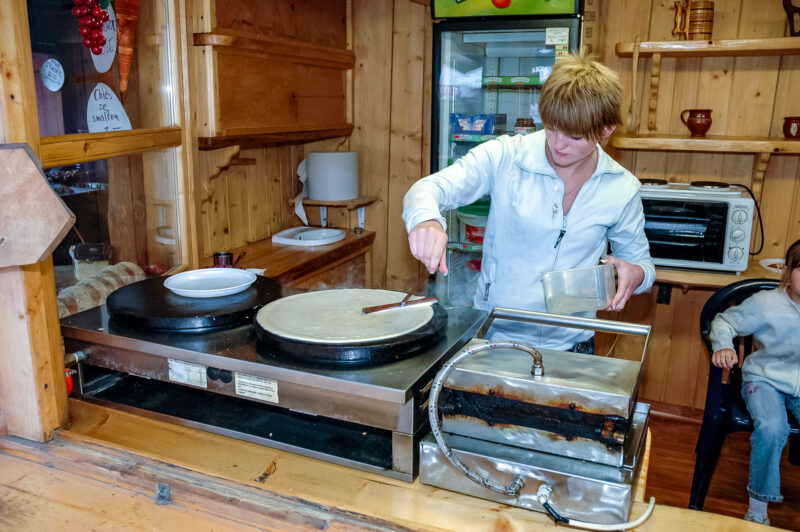
K and I shared potato pancakes with garlic sauce
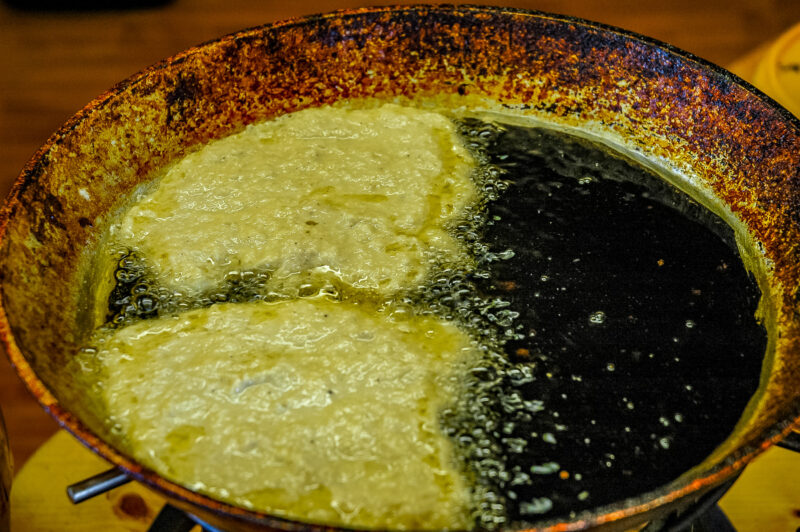
And something Poles will recognize but I will refrain from describing further:
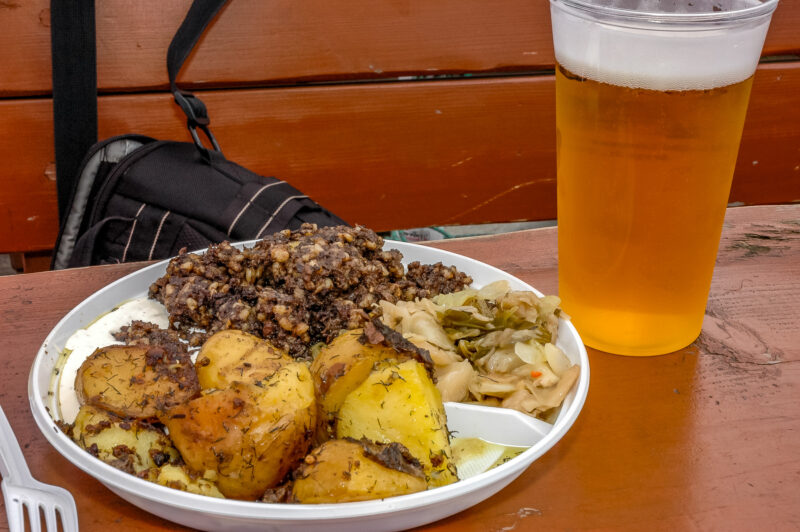
We went to the new “line park.”
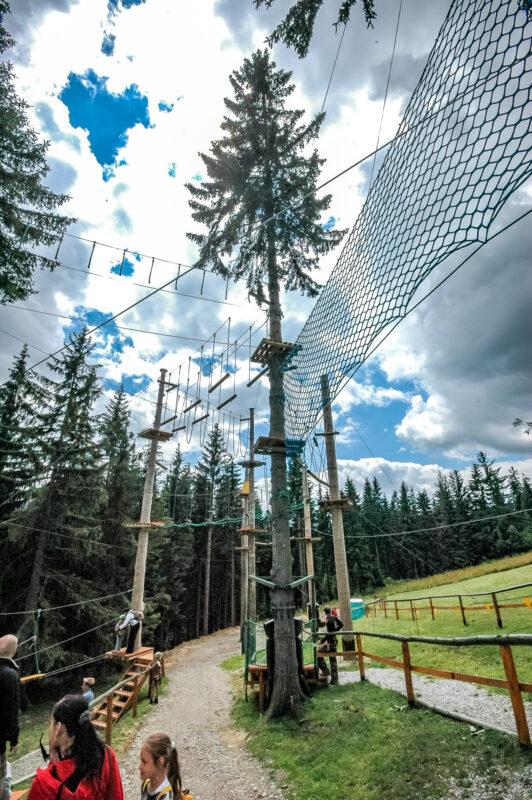
Cousin W had a blast on the kids’ zip line.
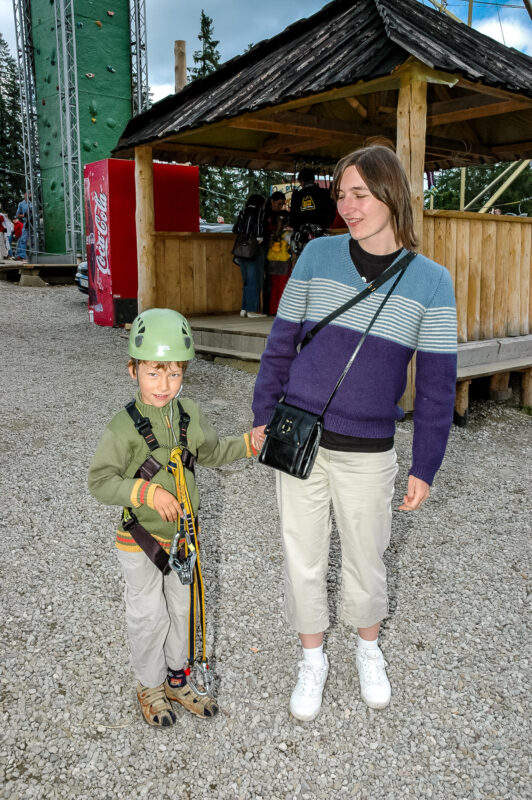
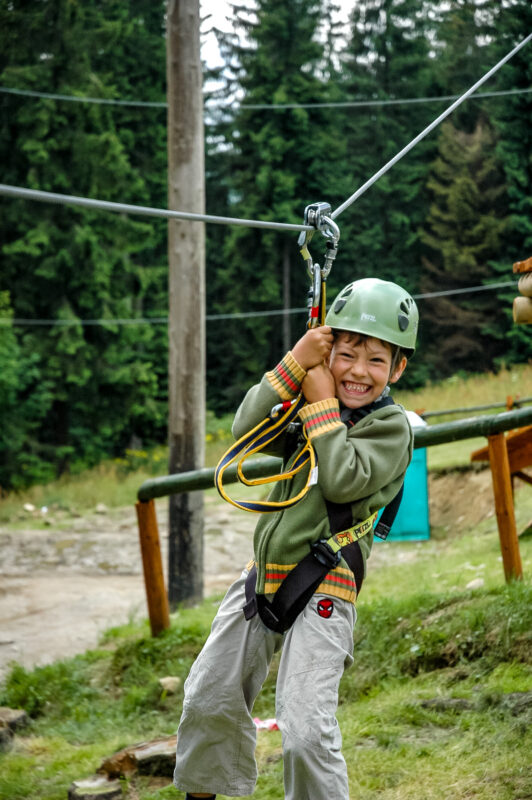
Then a pony ride,
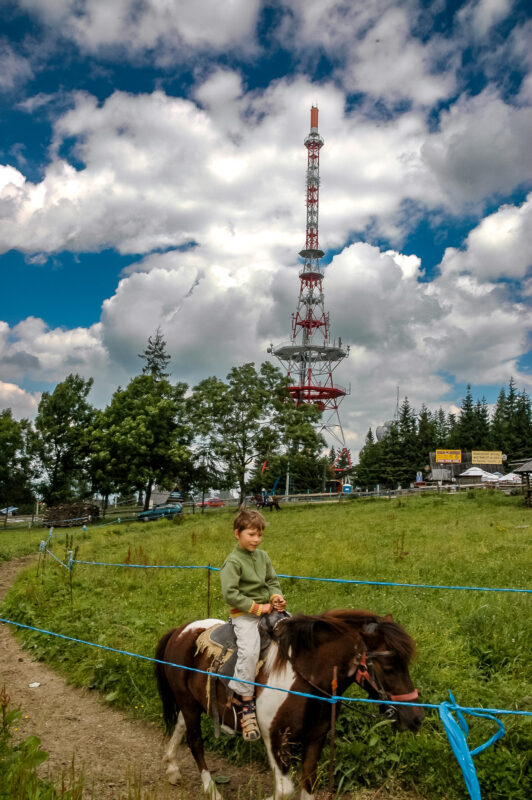
a group portrait,
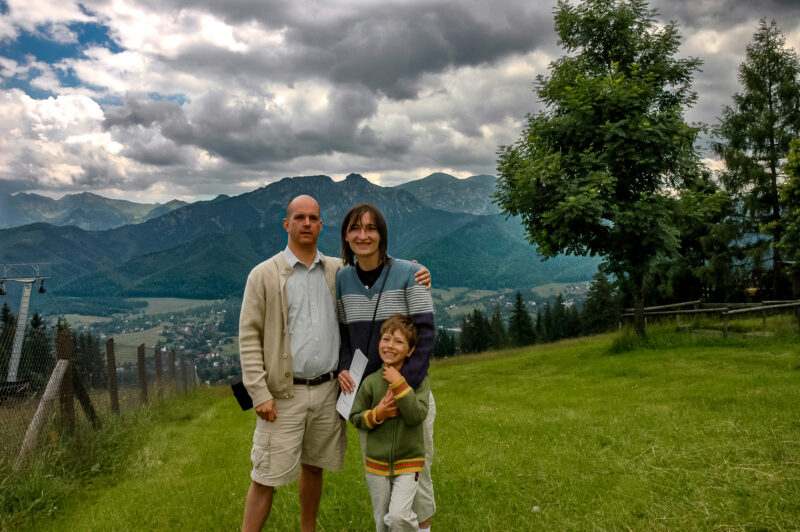
and a return to a young lady very happy to see her mother.
Tooth
Today we visited Aunt Z in Zab (Tooth) — the highest village in Polska.
A few minutes’ walk from Aunt Z’s and this is the view:
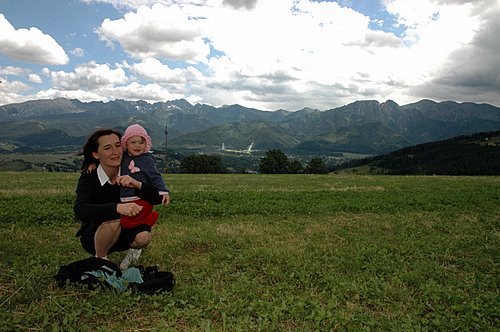
A storm came in quickly:
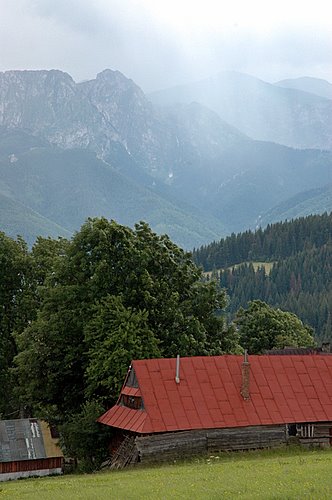
It passed and I took a walk in Aunt Z’s back yard:
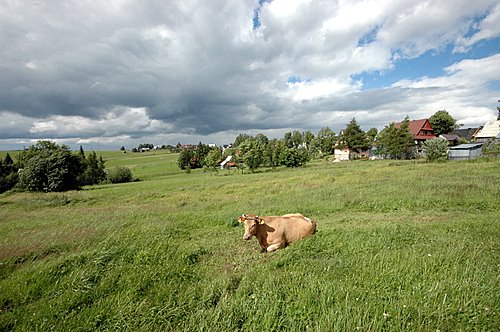
Despite all this — the beauty, the storm, the intensity of the views — people continued working as if nothing were out of the ordinary.
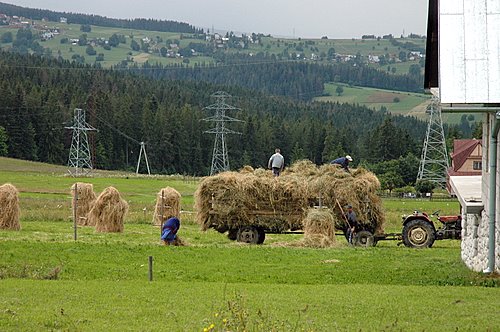
And as much as I would like to write more and add more pictures, the family awaits downstairs.
There might not be another update until Monday. We’ll see.
Now, I have more important things to do, and you do, too. Go find them!
A Walk in a Valley
We could have easily come to southern Poland and not crossed the border into Slovakia and no Pole would say a thing. However, to spend two weeks within 45 kilometers of Zakopane and not spend a day there?! A shame — no, a sin!
Well, truth be told, Zakopane is packed, packed, packed with tourists, and it’s more like a trip to Gatlinburg than anything else. Still, it’s Polish Gatlinburg, and that makes all the difference.
We began our day with a walk in Stzazyska Valley. We left little Cousin S behind because she doesn’t like to walk so much as she likes to be pushed about in her carriage, and not having another Ergocarrier, it seemed like a potential disaster to have both of them with us.
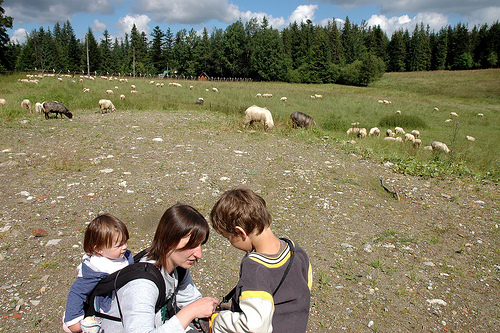
We didn’t get very far before we pulled out the camera. Next to our parking was a herd of sheep. L was so excited she could really hardly stand it.
After a few minutes with the sheep, we finally made it to the trail. It didn’t take long for the views to be come awe-inspiring.
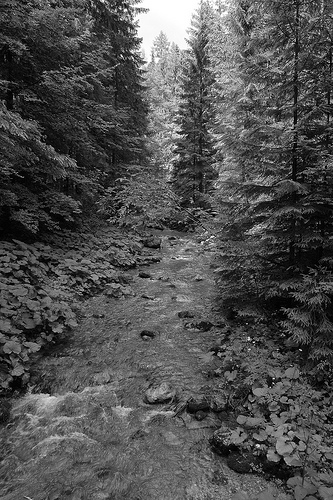
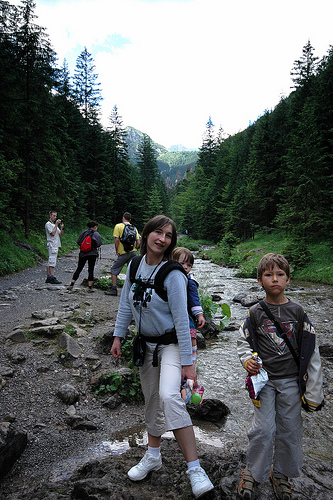
This particular valley leads to the base of Giewont, the Sleeping Knight. Legend has it that, in times of national trouble, the knight awakens and defends the homeland.
“Slept well through September of ’39,” I laughed. “Oh, it’s just a legend,” K replied, spoiling a perfectly good joke.
Quickly enough, we made it to the base, where the slacker knight is clearly visible.
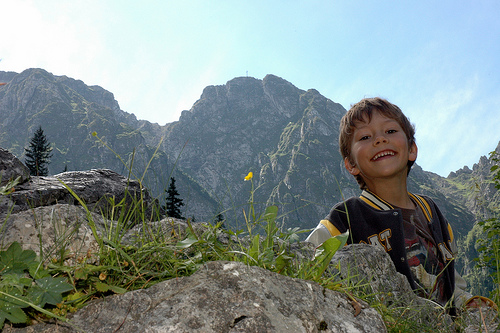
Well, clearly visible if you know what you’re looking for. Perhaps a more conspicuous knight would have been a more effective prophylactic, but that’s neither here nor there.
If you look at the picture, you’ll see a small cross at the top of the mountain. That’s supposed to be his upper lip. To the right of that is an enormous nose — given the antisemitism of Poland and the accompanying Jewish stereotypes, I’m surprised it’s not called the Sleeping Jew. None the less, you’ll find the knights eyebrow just to the right of the nose. Come to think of it, the Sleeping Marx Brother might be the most accurate name.
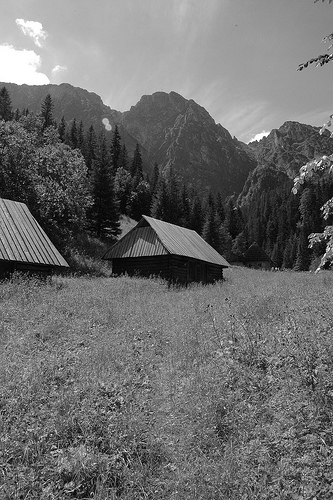
We took the opportunity to take a break and relax a moment while sipping instant coffee (5 zloty) and tea (5 zloty — regular, not instant), while Older Cousin W had a Sprite (5 zloty — noticing a pattern?).
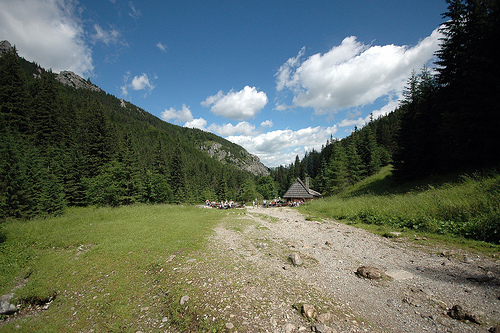
Then again, given the fact that things seem to be delivered by horse here might explain the cost. Might.
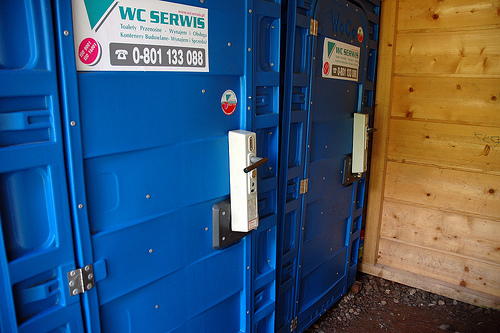
A quick bathroom stop reminded us that we’re in Poland. We paid 20+ zloty for snacks, but we still had to pay a blasted zloty for the bathroom.
“Do you have a zloty?” I asked K when she said she wanted to go to the restroom.
“You have to pay?” she asked.
“Of course we have to pay! We’re in Poland!” I said, loudly. In Polish. No one said anything.
I guess that’s not much of a converstion starter.
After our break, we began the final 10 minutes to our ultimate destination.
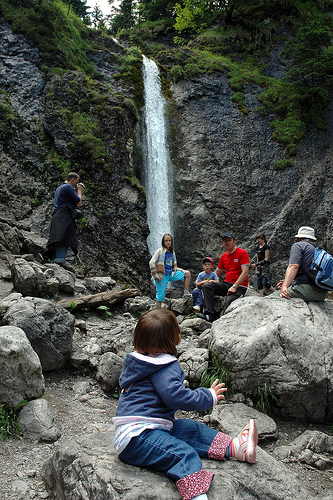
It was impossible to get L to turn around for a picture. Why look at a big stupid camera when you can look at this?
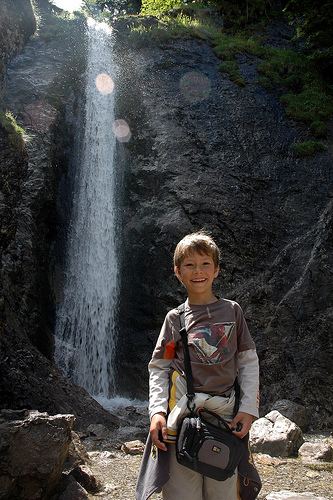
After L had climbed on every rock we’d allowed her (and then back down, and then back up, and then back down, and then back up), we decided we’d better head back or start looking for suitable lodging…
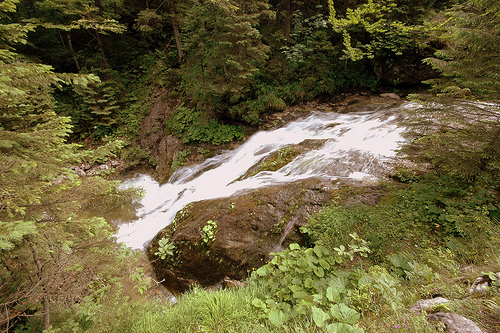
We stopped at the bottom of the trail for a bite to eat and yet another reminder of where we are:
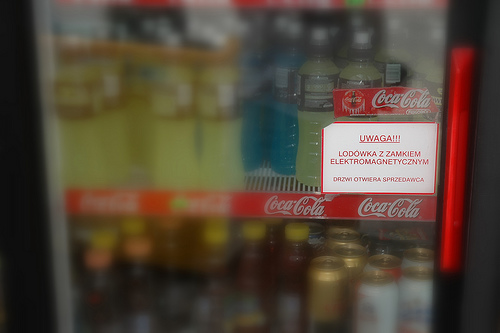
Poles in the States often comment on how relatively little minor thievery there is in the States. A good example (though not in the States) was in Budapest at the biker camp at which K and I stayed. There was a huge refrigerator filled with soda, beer, juice, and water, with a clipboard beside the fridge. The honor system: write down how many of what you take and pay when you check out. K was shocked. “Do you know how many people would pay in Poland?!” she asked.
Even Dziadek noticed and commented on that in America. Things that would have been chained to something — anything — immobile in Poland were sitting seemingly out in the open in the States.
This refrigerator was just outside the door of the little kiosk, yet locked. I’d wager that in the States it wouldn’t be. Then again, in the States it also wouldn’t have beer next to Coke.
After tanking up, we made our way to Zakopane, parking in the main lot under two bridges and making our way through the market — also under two bridges.
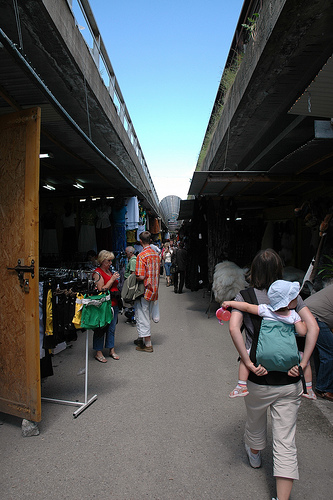
It’s a market where you can buy literally freshly-woven (if there is such a thing) socks.
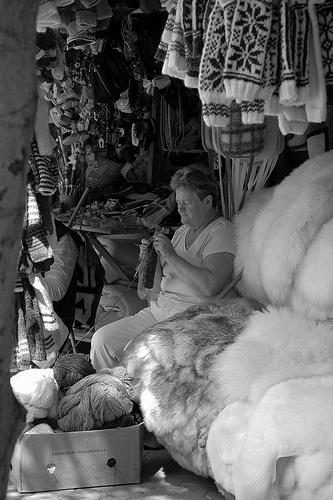
Or buy relatively-ridiculously cheap hand-crocheted table coverings from the craftswoman herself.
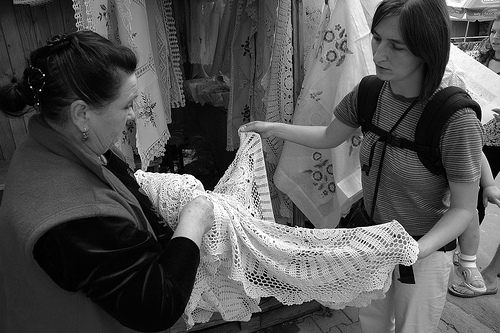
They say Poland is getting too expensive for Americans, and it is. The zloty now trades at 2:1 was opposed to the 4.5:1 it used to. Beer no longer costs 75 cents but instead two dollars. Still, we more or less stole this from the woman; she gave it to us for so few groszy. (Or, to be more correct, “groszych”.)
And what would the market in Zakopane be without a cheesemonger? On every corner.
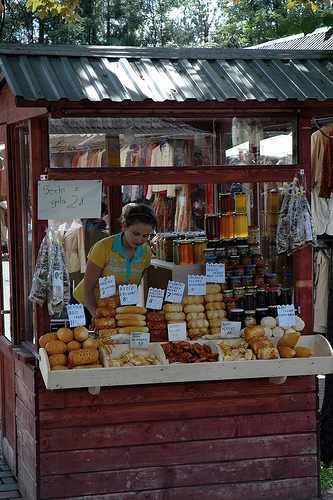
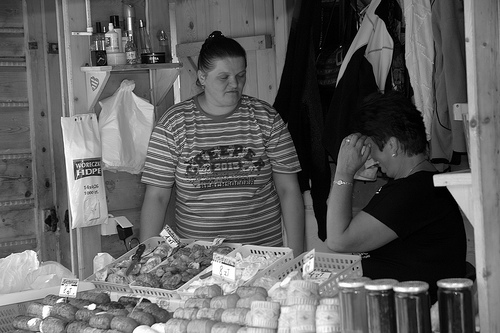
Not to mention wooden-toys-leather-hats-cheap-plastic-goods-mongers.
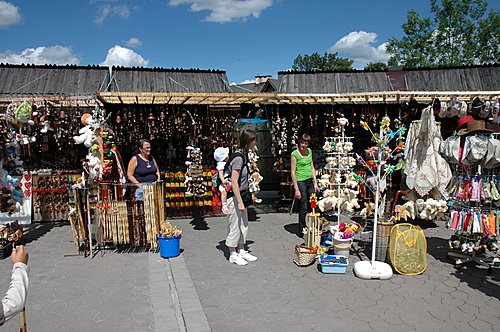
There’s a monger for everything here.
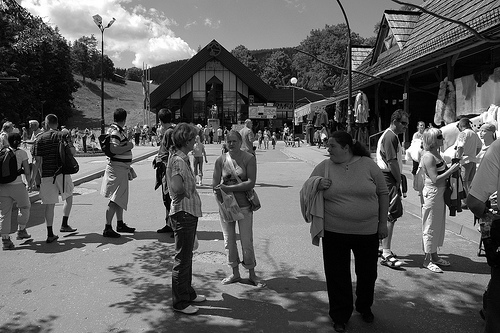
These ladies were ticket mongers. Scalpers, in other words. The large building behind them is the loading ramp for an inclined railway to Golbolowka — we’ll be going there Wednesday. They were offering “no-wait” tickets. And the one in the middle disappeared quickly when I began taking pictures.
Odd.
Next stop: Cmentarz Na Paskowym Wierzchu (Cemetery on Paskowy Wierzch), final resting place of more famous former-Podhale residents than you can shake a gofr at.
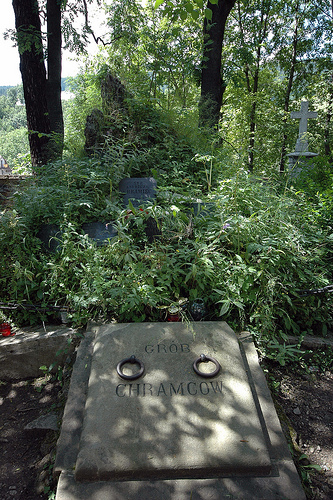
Not to mention a few unusual gravestones.
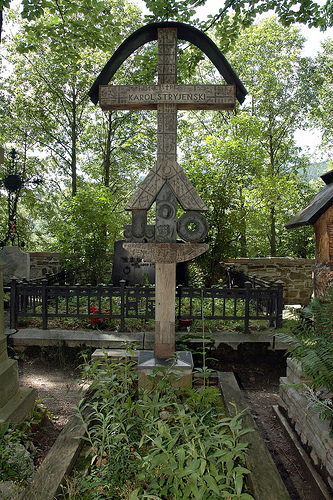
We wondered around a bit, pondered our mortality amidst the cries and whines of tired children, then decided it was time for gofry.
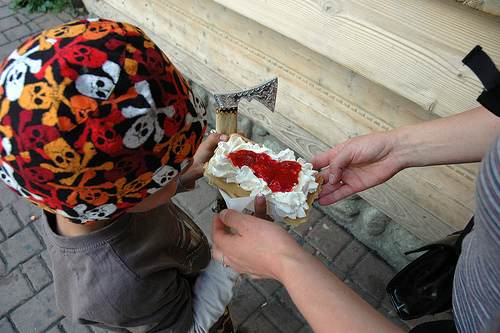
Yeah, it’s just a waffle with whipped cream and strawberry sauce — as if you can append “just” to anything with real whipped cream and tangy-sweet strawberry sauce.
We weren’t the only ones enjoying a sweet afternoon.
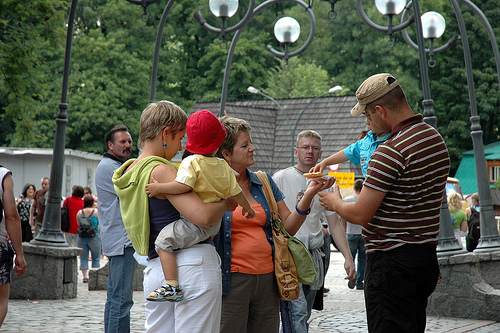
“This place is the best place in all Podhale for gofry,” K declared.
We finally found some refrigerator magnets — a habit Dziadek got us into during his visit.
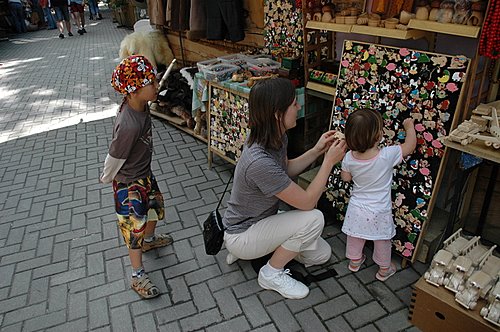
And K and the kids had their picture taken with the man with the easiest job in all Poland. Get dressed up like an old, bronze statue and move only when someone drops a coin in the can in front of you.
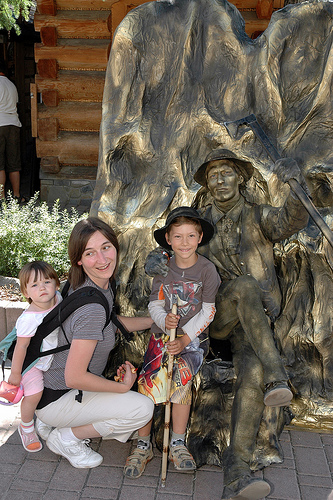
Slovakia
Technically, this post is a day late. And I should be talking about our amazing walk in the Tatra Mountains. But that’ll come tomorrow. In the meantime, Monday’s adventures.
We can’t come to southern Poland and not cross over into Slovakia. It’s beautiful, and cheaper.
First stop: Namestovo.
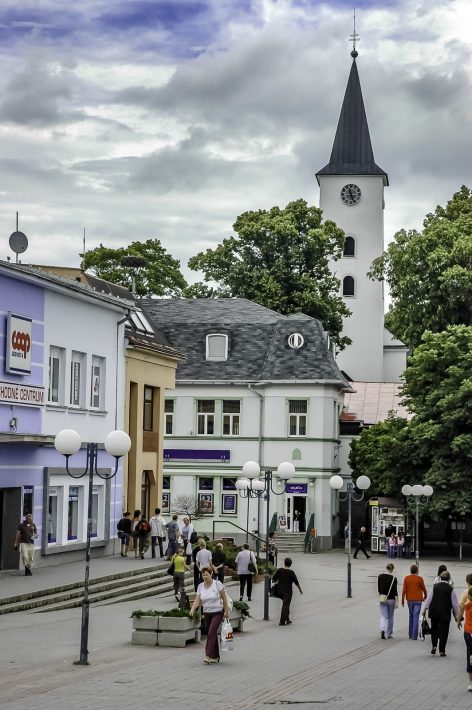
Namestovo is odd because it doesn’t really have a square as much as it has an L.
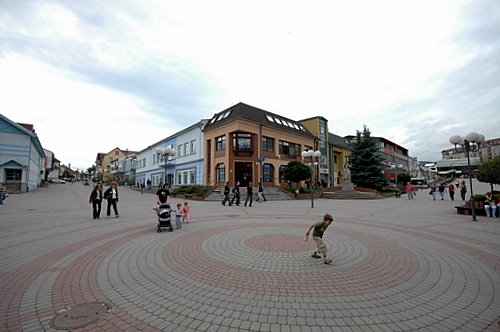
Slovaks, like many Europeans, think nothing of a beer with friends at 10:30 in the morning. I think it’s more common the further east one travels, but I do seem to remember reading about folks in Spain having brunch with a beer.
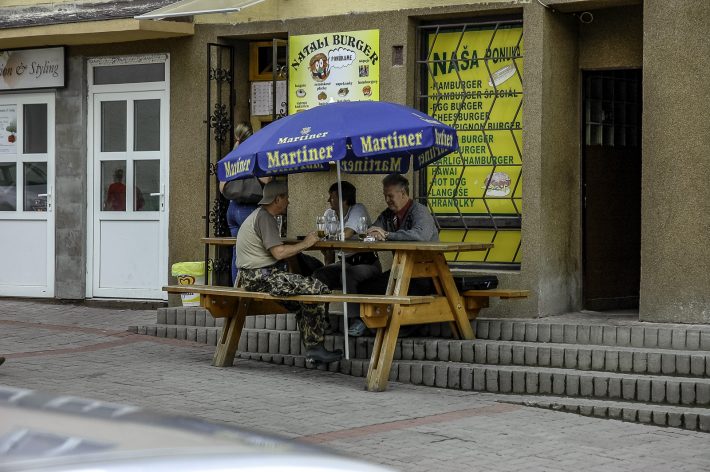
We walked around for just long enough for us all to be surprised that it was already 12:00. Lunch — and swings.
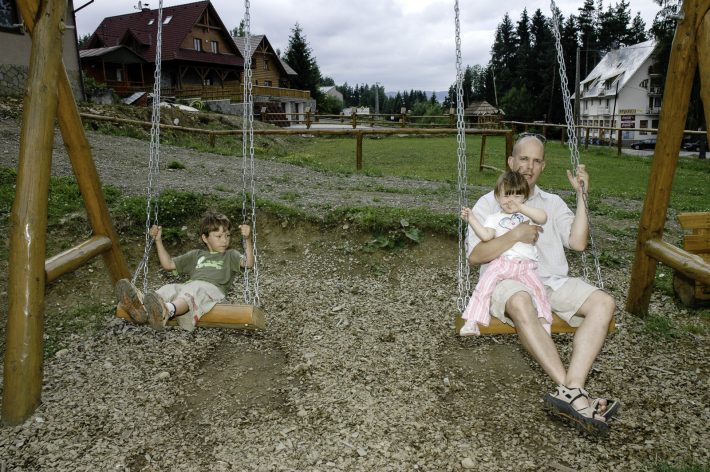
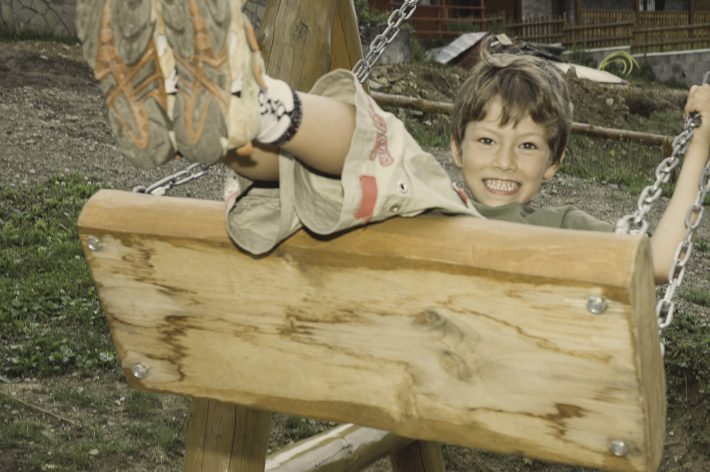
Everyone else was talking about what to eat — well, K was talking to the two kids who can express their desires verbally — but I knew from the moment we decided to spend the day in Slovakia: bryndzowe halusky.
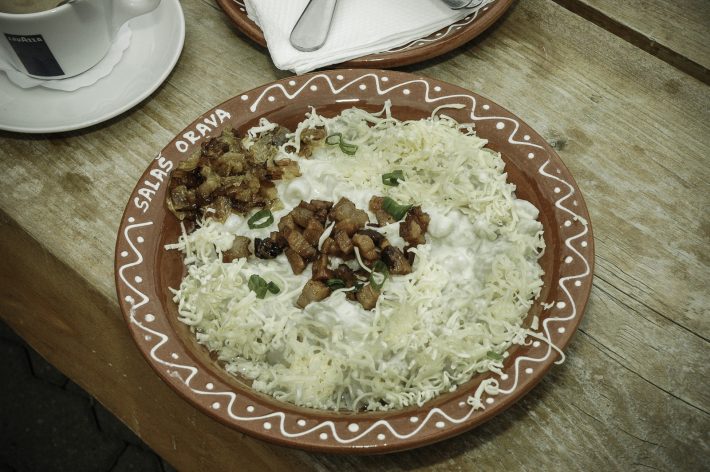
Basically, it’s dumplings in a creamy sauce, with this particular version having bacon bits and onions added. Smooth, tangy, creamy — I could eat a bucket of this stuff!
I’ve already told K that we’ll have to cross the border once more for a second helping!
Afterward, it was time to take the kids on a boat ride.
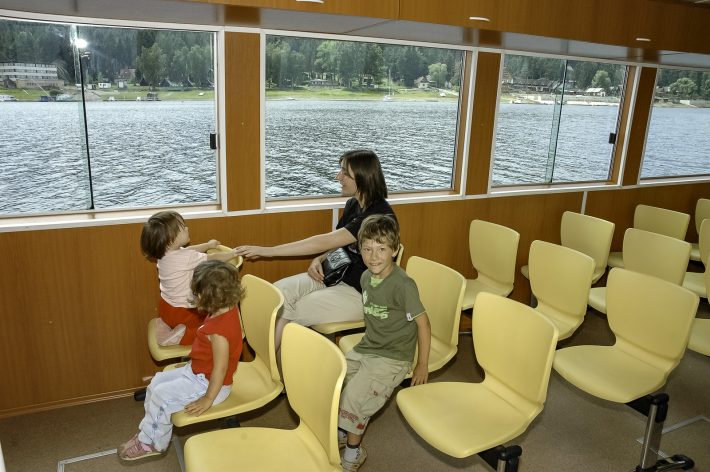
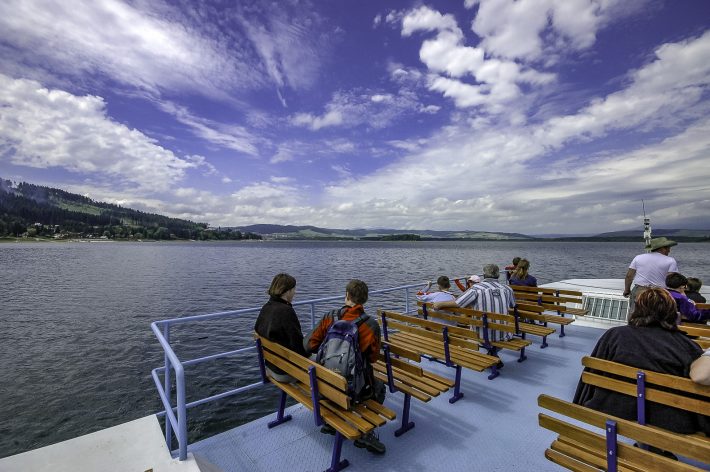
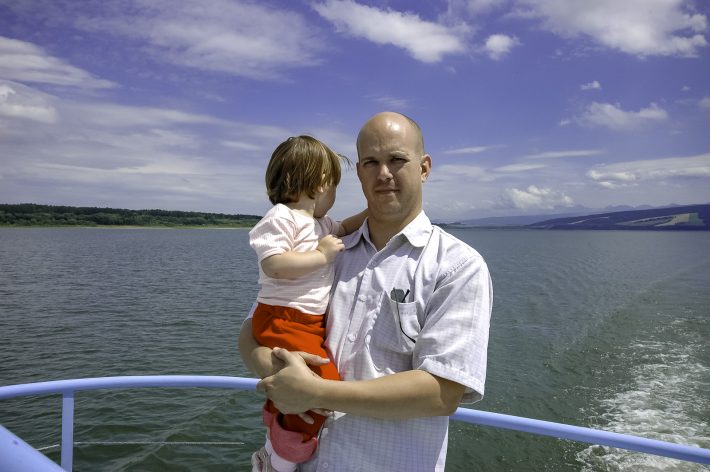
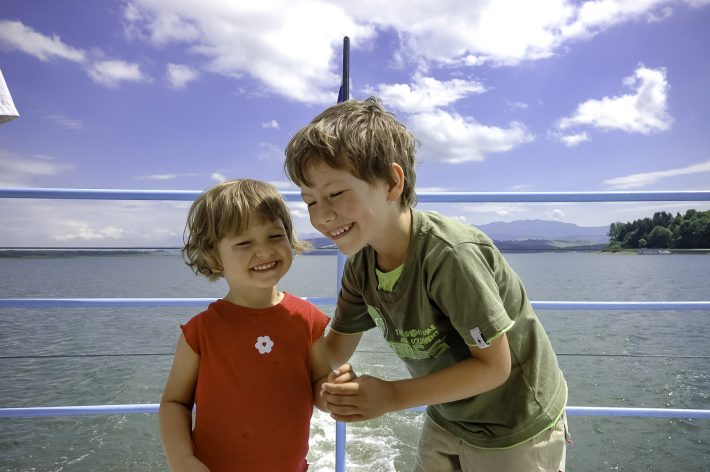
Lake Orawa is an artificial lake. Beneath its waters lie four villages.
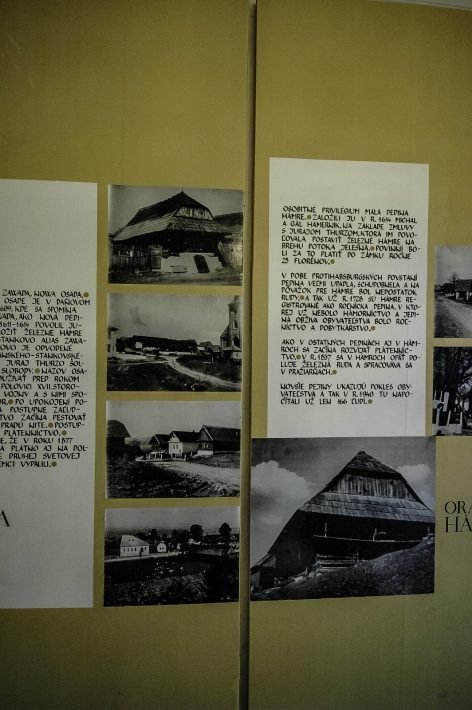
In the middle of the lake stands an island with the only surviving remnants of antediluvian Orawa.
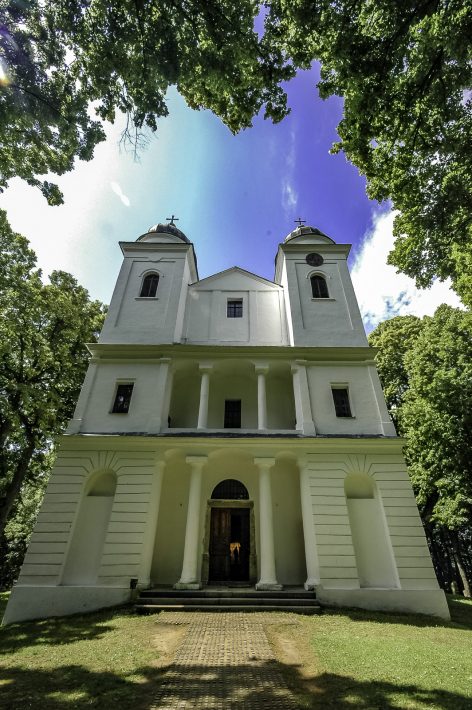
A surprisingly-large church that’s been converted to a museum. (We took Nana and Papa here, before they were “Nana” and “Papa”. It was a gloomy day in comparison.)
On the way back, we got a good look at Namestovo.
Odd — it’s now a lake-front town; pre-flood Namestovo would have been a mountain-top town.
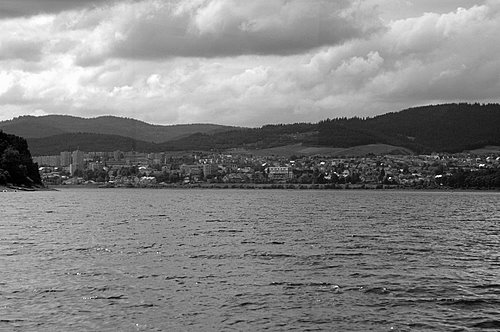
It had always been my understanding that Namestovo more or less was created for the relocation of all those displaced by the creation of the lake. K assures me that it’s not, and there’s no mention of it in Wikipedia. Besides, K made a great point about communist architecture at the time: “Come on — if it had been all built at once, every building would have been identical.”
When we returned to shore, we took a few pictures. It’s fairly obvious the two youngest cousins are getting along swimmingly.
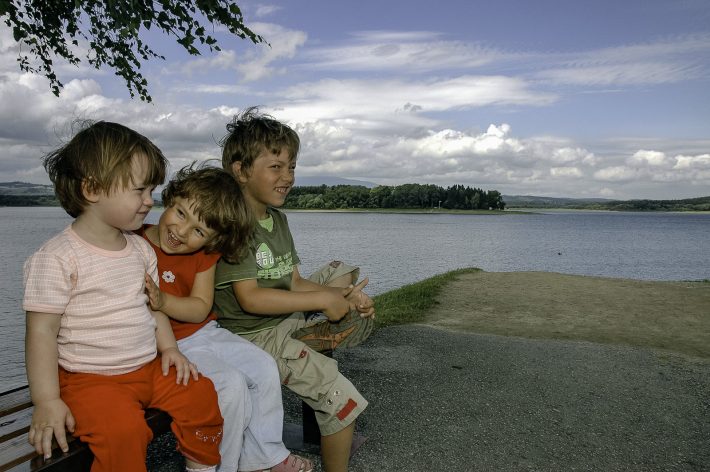
It’s hard to believe that, despite the similarity in size, Cousin S is over a full year older than L. “She’s a brick,” everyone says.
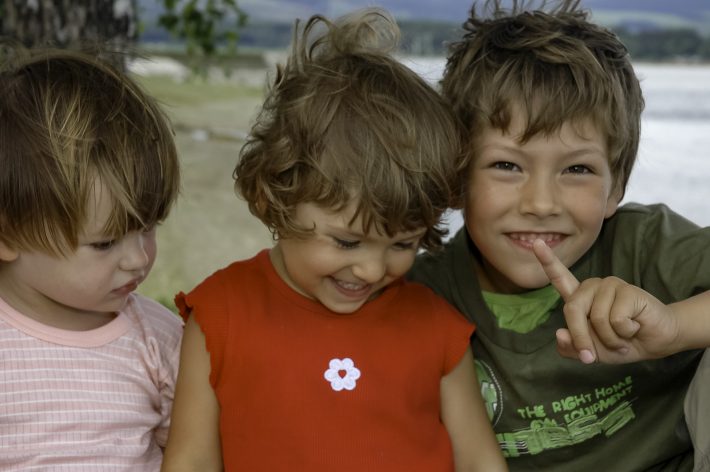
On the way back, we stopped in Bobrov — the Slovakian last town on the Slovakian/Polish border when you cross the border at Winiarczykowka, the small border crossing at Lipnica Wielka.
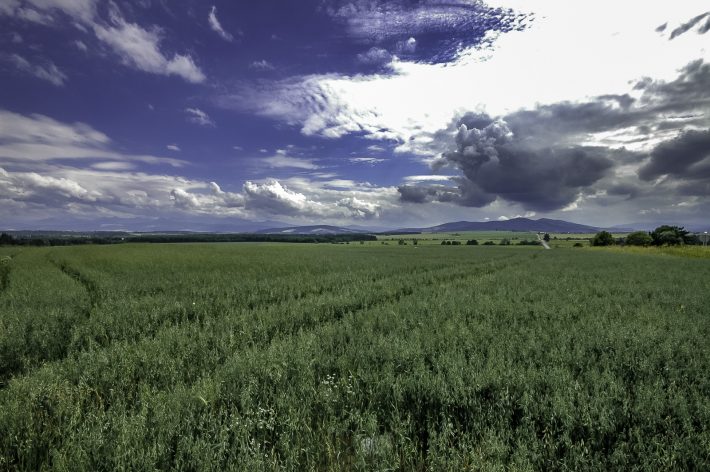
I’d cycled this way countless times when I lived in Poland. Of course, they’ve redone the road in the meantime, which would have made my favorite ride even better: by the time I got to the end of this road on a road bike, I often had to take a break, not because I was tired but because my forearms ached from riding over such a rough road
We also got a clear indication of just how rural this area is:
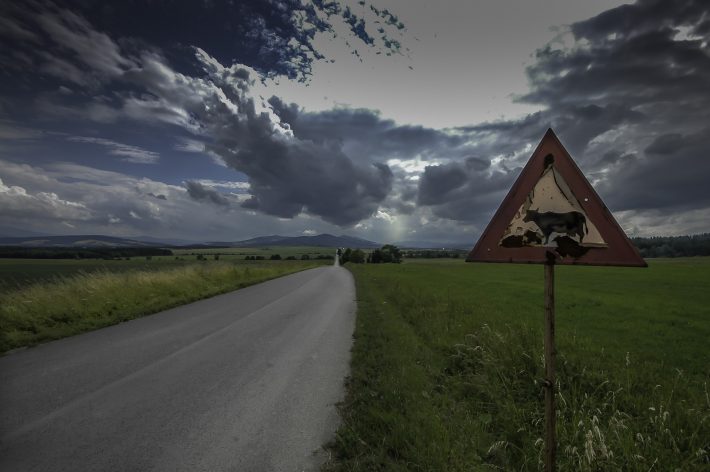
The view from the Polish side of the border wasn’t much different.
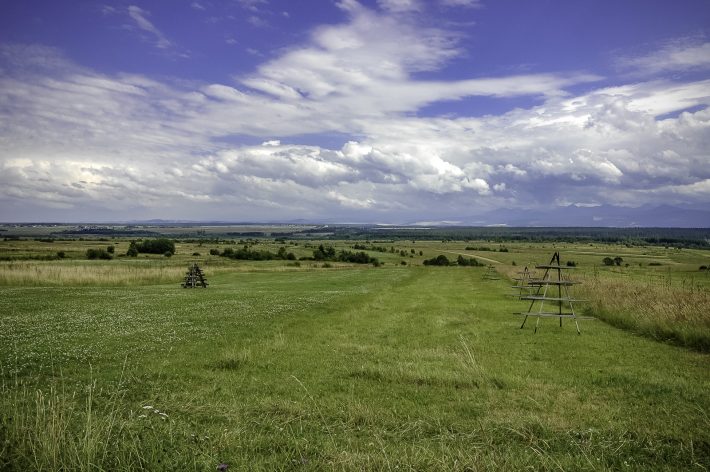
Borders are such strangely arbitrary things. This area is particularly odd. There are masses in Slovakian in the church in Jablonka, yet Slovakian cuisine is really radically different than Polish, even at the borders. The languages are similar (Poles tend to think Slovakian sounds like Polish baby-talk) but the mentalities are different.
When we got home, it was time for the youngest cousins to complete their evening rituals.
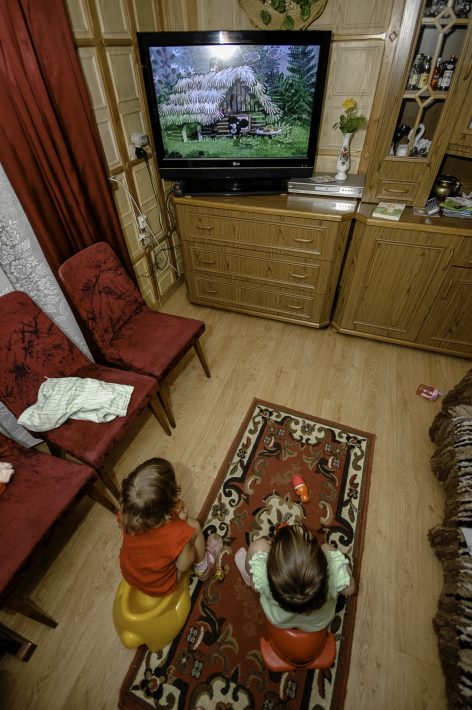
The cartoon they were watching is a Czech cartoon about a little mole who has various adventures with rockets and pregnant rabbits. (He helps birth three rabbits in a rather graphic scene.)
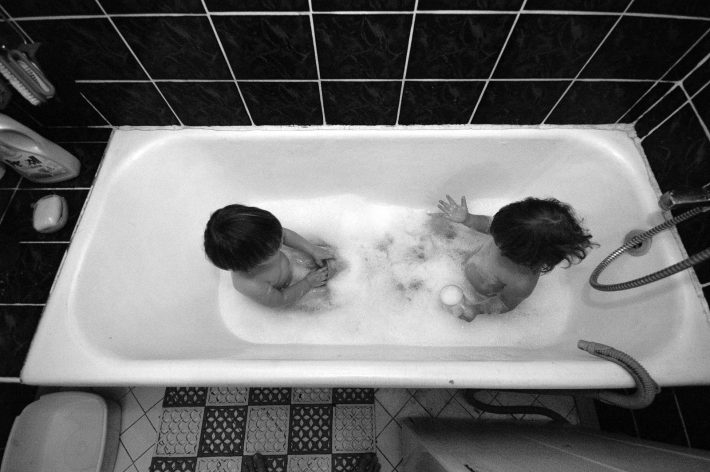
As I said, they’re getting along swimmingly.
